#Chinese Six Companies
Text
I’ve just learned about ghost marriages. Feeling many emotions at once about this.
#Chinese beliefs are so interesting#my bosses are from China and they tell me the coolest things#like!!! men essentially court women into dating them. showing them with gifts. paying for the wedding and the HOUSE and-#in some provinces it’s common to rent EIGHT cars for your wedding#my boss’s husband rented six#and mandarin oranges are a symbol to bring wealth#so they eat a lot of them in the new year#and the company my boss used to work for planted mandarin trees in front of their building#which is apparently common to do in the Guangdong province#so..just a little fun fact for anyone that dares to read my tags#personal#all this to say I bought mandarins today at the grocery store#with intent!#bring in that cash for my lunar new year babbyyyy
2 notes
·
View notes
Text
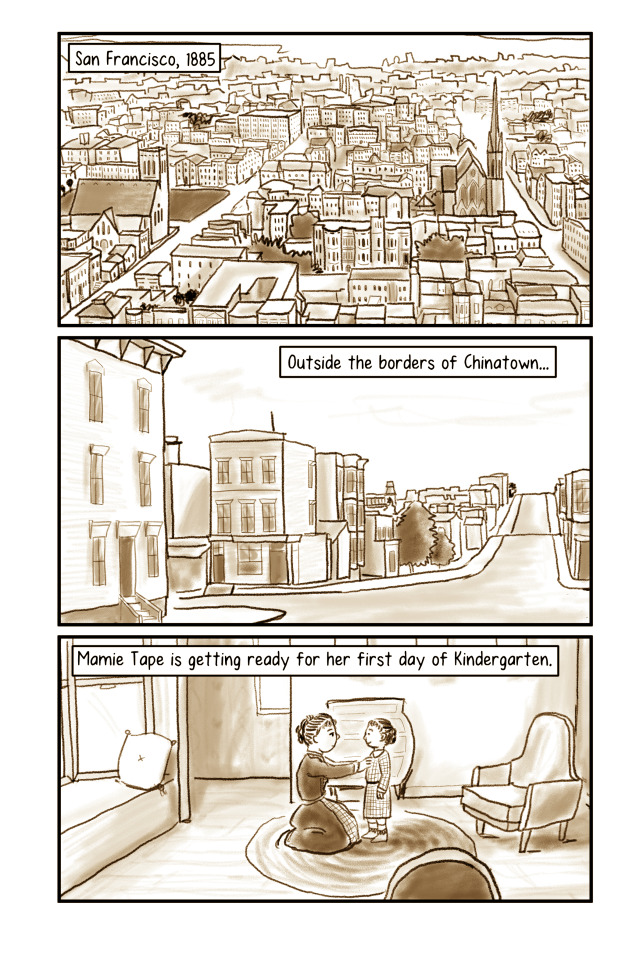
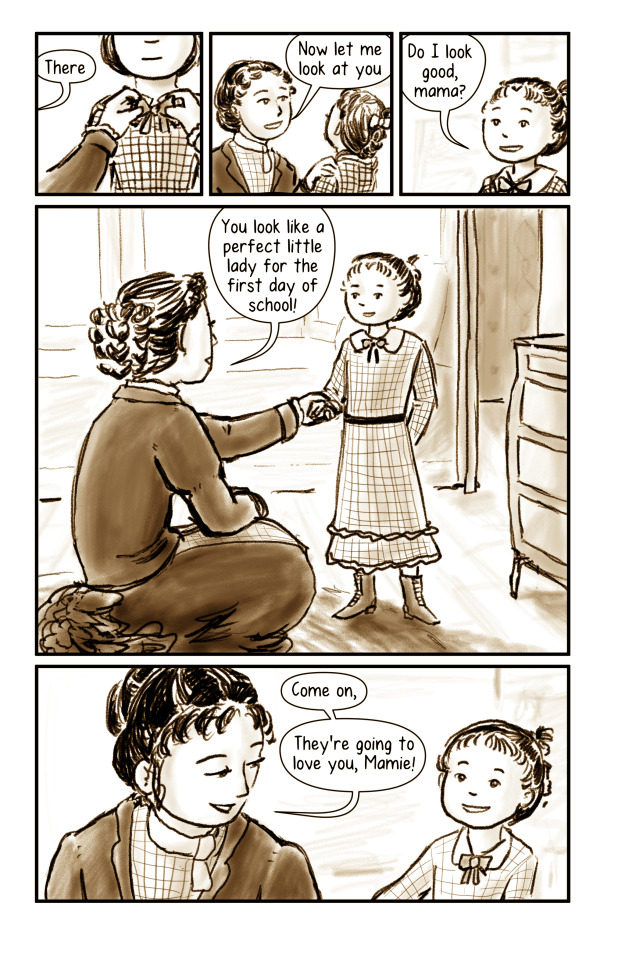
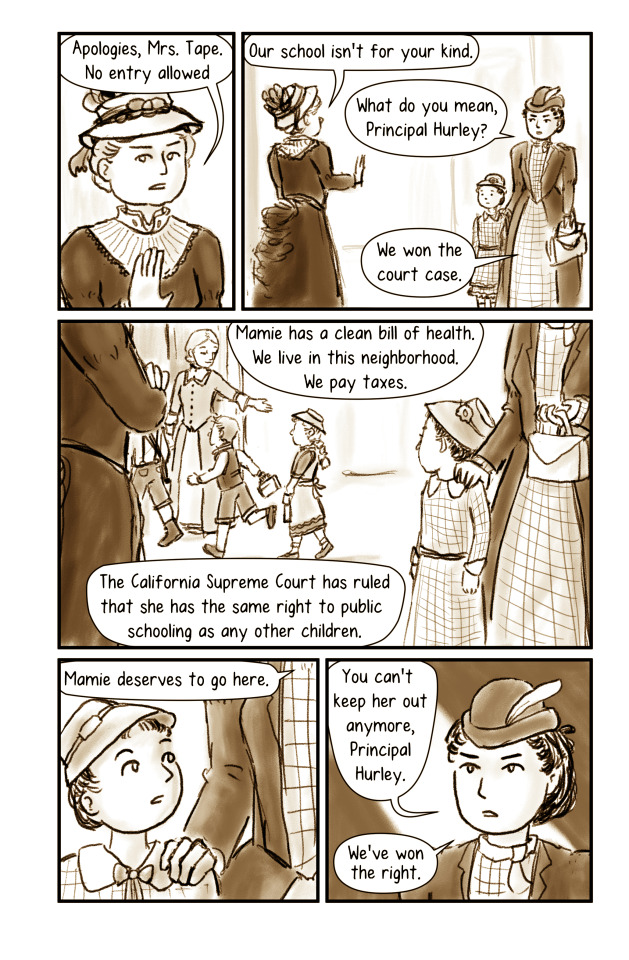
in my pursuit of ever-increasingly niche comics, I drew a 13 page comic about Tape v Hurley, a court case about Chinese-American school segregation in 1885. The rest of the pages are after the readmore, as well as on AO3 here. More obsure Chinese American court case comics are there, as well.
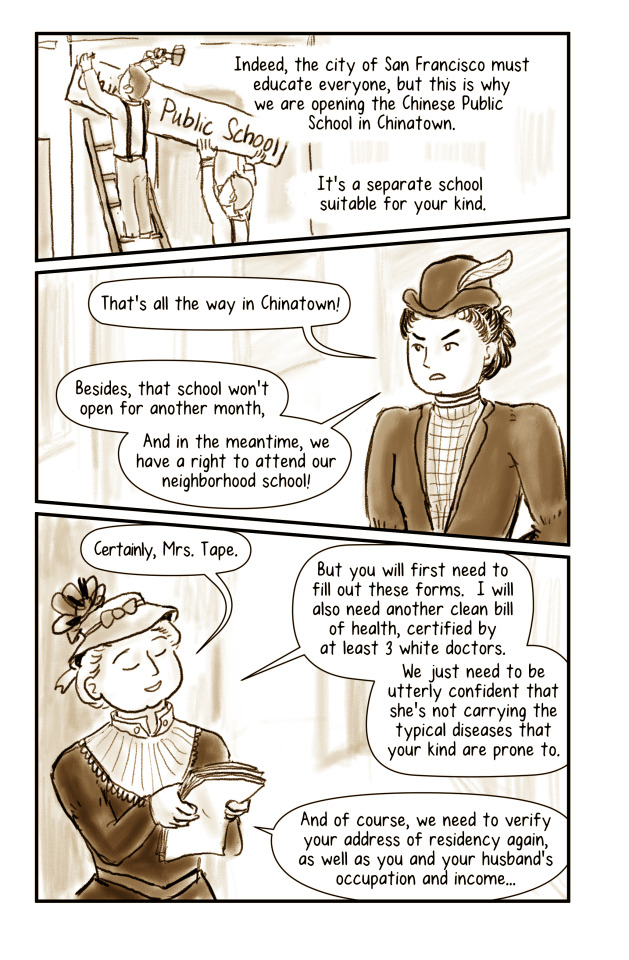
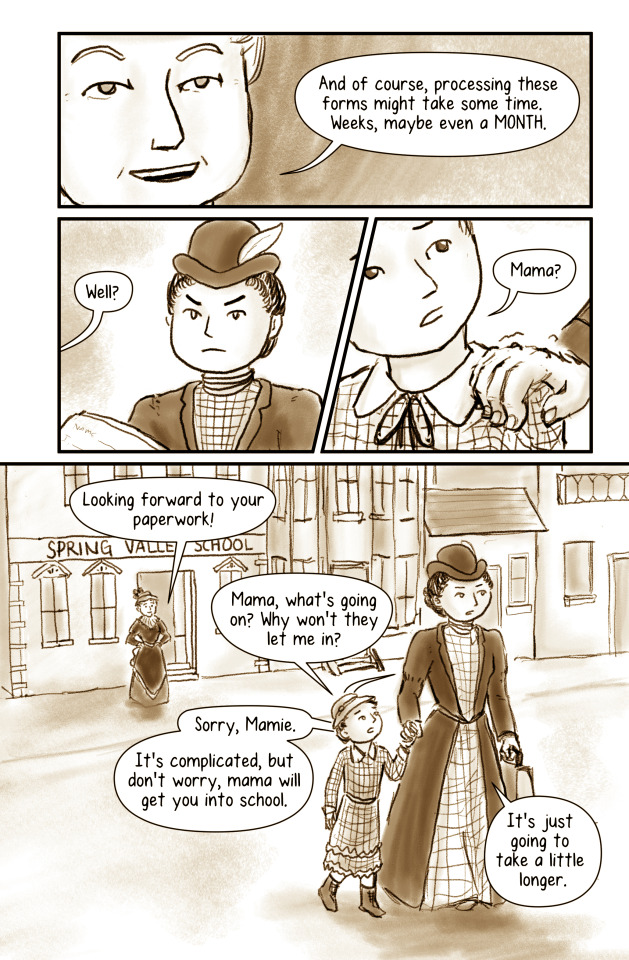
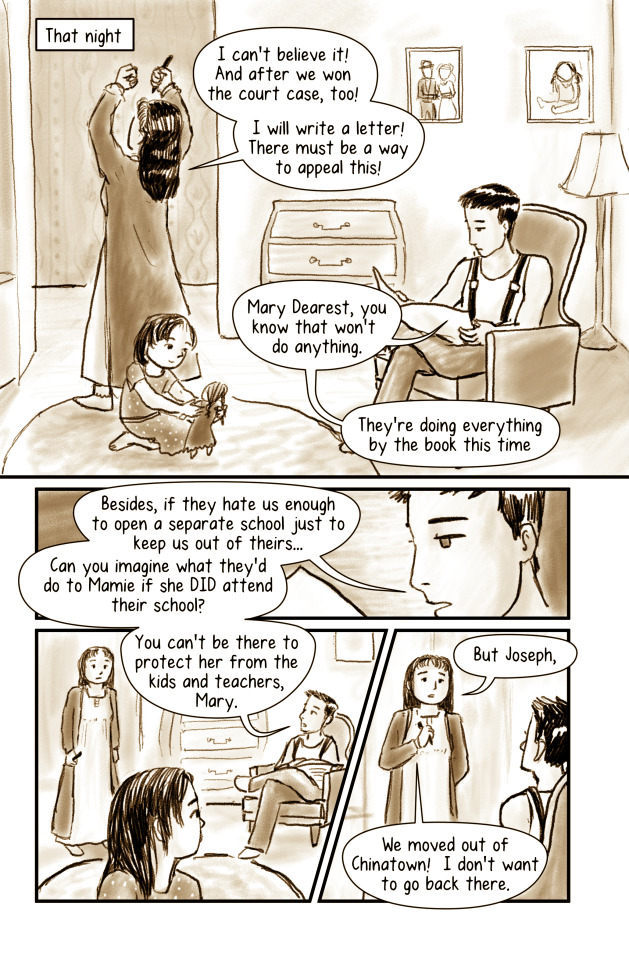
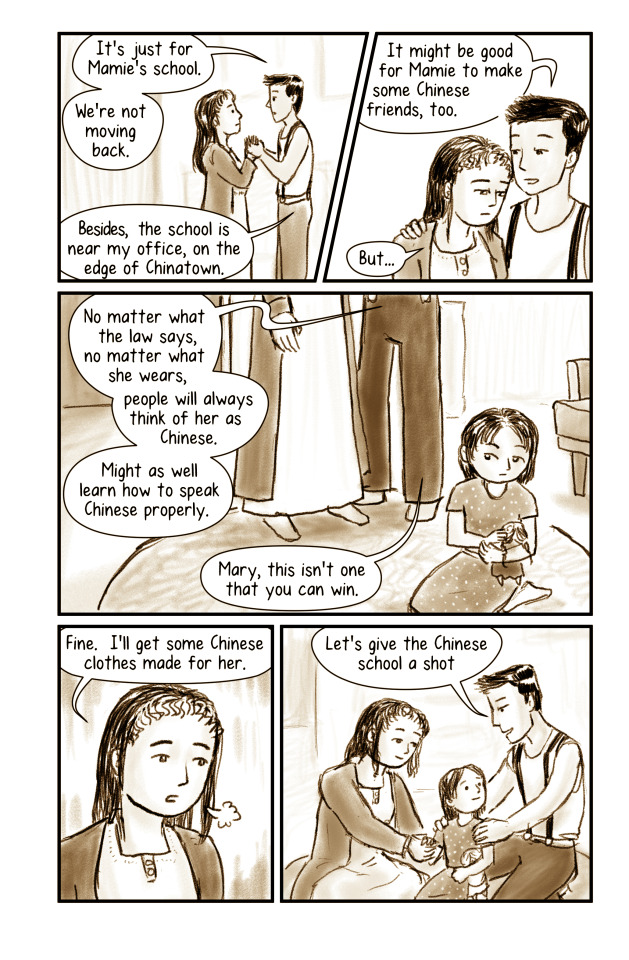
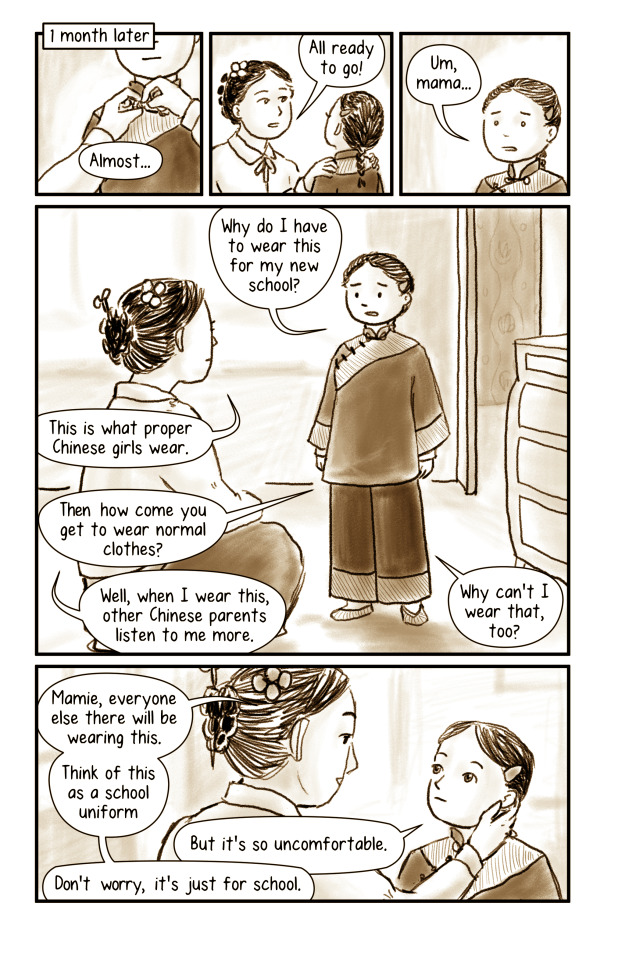
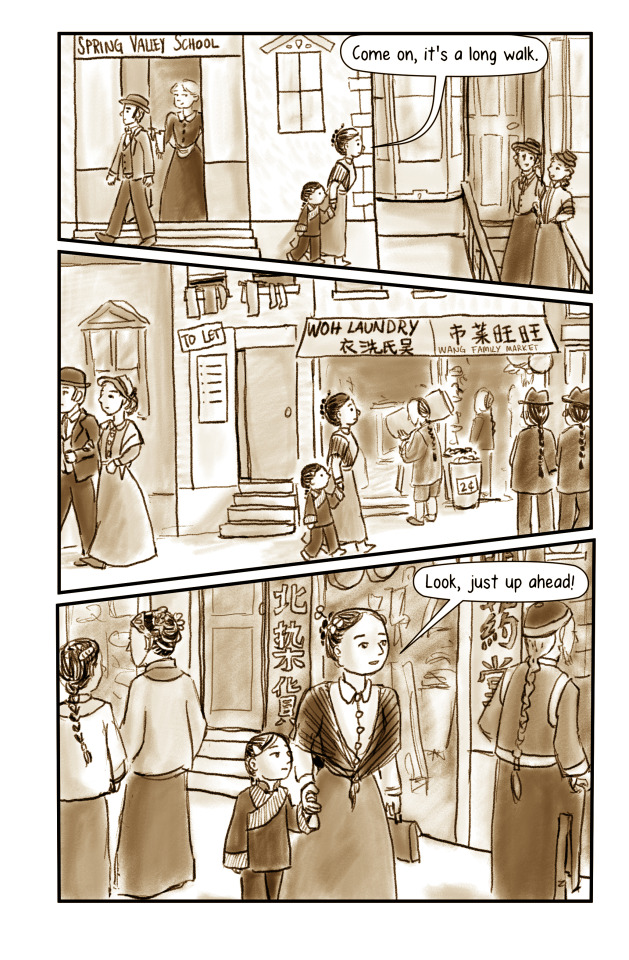
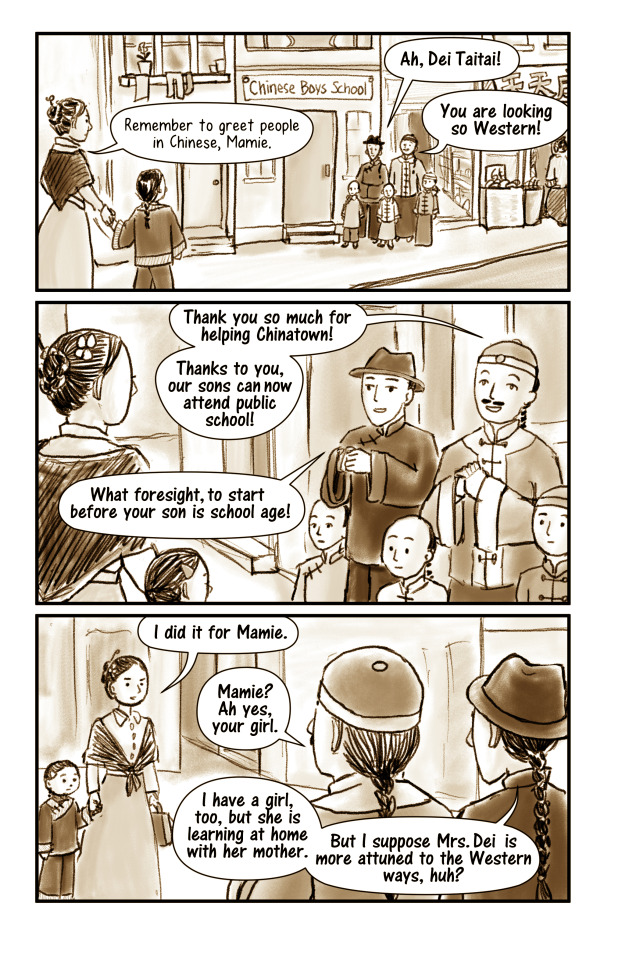
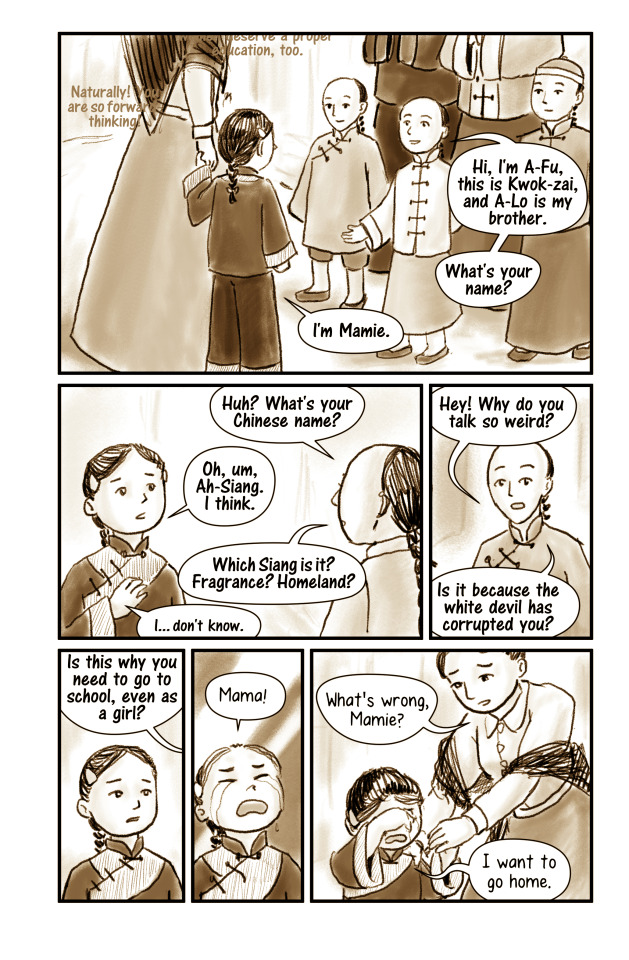
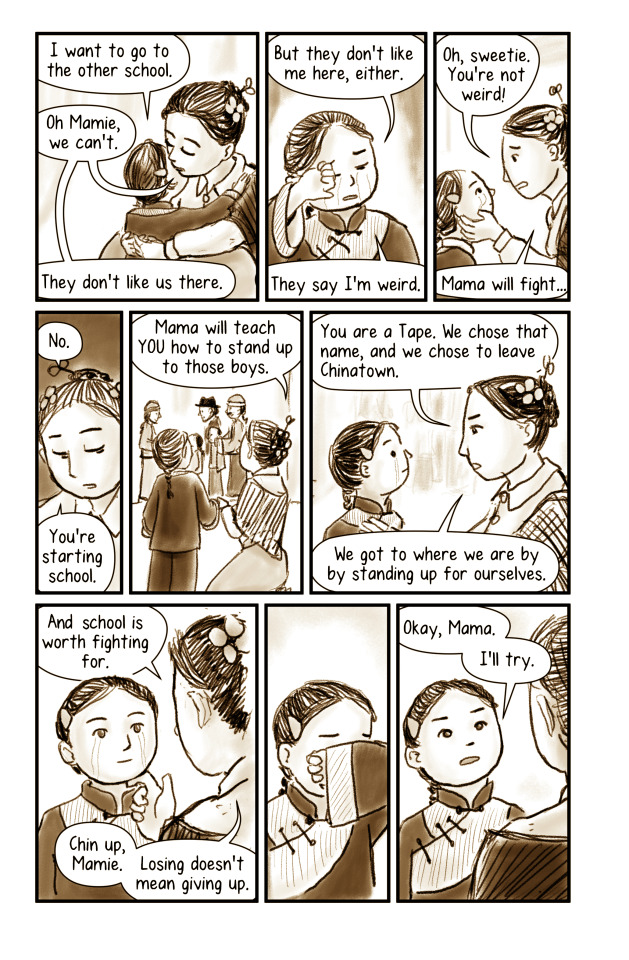
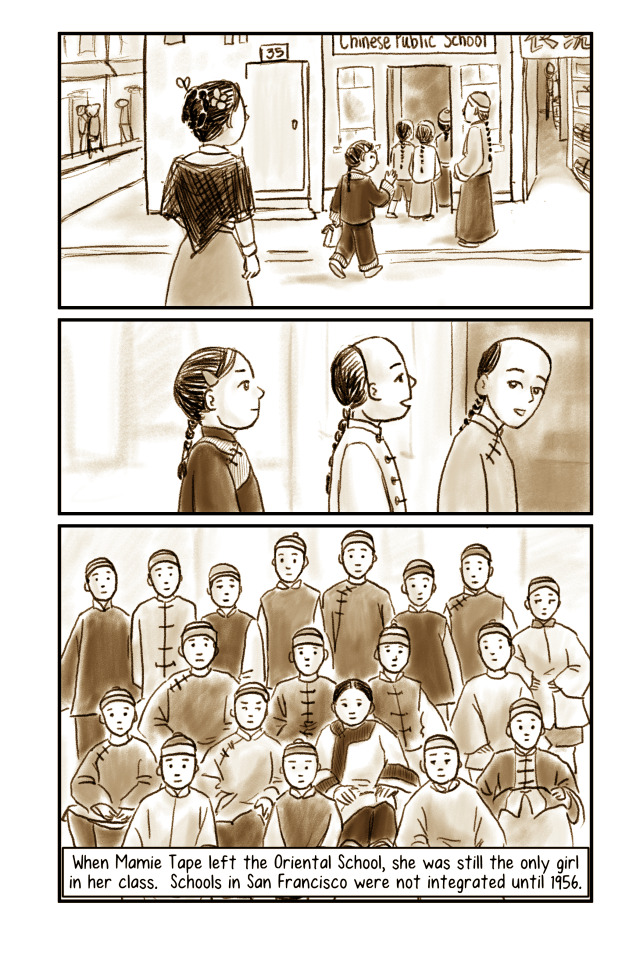
Historical Notes
Mary and Joseph Tape were not born in America, but their names and identities were very much formed in America. Joseph Tape was born Jeu Dip in Guangdong, China, immigrated the America when he was twelve, and spent his teenage years working as a house servant in an Irish household. Mary arrived in America at the age of eleven, and was found and raised as Mary McGladery in a Protestant orphanage as the only Chinese child amongst ~80 children. Both Mary and Jeu spent their formative years amongst White Christian families, so when Jeu Dip and Mary married in 1875, little wonder that Jeu picked the English name of Joseph Tape -- Joseph to match with Mary, and the German last name Tape as a nod to his former name of Dip.
The Tape family lived about 14 blocks outside of Chinatown, in a primarily white neighborhood. They dressed in Western clothing, spoke English at home, and Mamie grew up playing with non-Chinese kids. Naturally, they wanted their children to attend the local elementary school, a mere 3 blocks from their home. The principal, Ms. Hurley, denied her entrance, claiming that she was “filthy and diseased.” At the time, there was no public school option for Chinese children -- the 1870 state law stipulated separate schools for “African and Indian children” only, not Chinese. The Tape family, with the help of the Chinese Six Companies, their church, and the Chinese consulate, decided to sue, claiming that the 1880 California school code guaranteed everyone a right to public education and that this was a violation of the 14th Amendment.
They won.
But this was 1885, three years after the passage of the Chinese Exclusion Act and six years before Plessy v Ferguson. Regardless of what the California Supreme Court might decide, public sentiment was on the side of the San Francisco school district. Determined to keep out this “invasion of Mongol barbarism”, the California State Legislature passed a law permitting separate schools for Chinese children, which then allowed Principal Hurley to reject Mamie Tape once more.
While Mamie was rejected from the Spring Valley Elementary School for being Chinese, she also had a hard time fitting in to the Chinese public school. The Chinese merchants saw Western education as something primarily for boys. (Their girl children learned from their mothers at home.) Mamie, a girl dressed in Western clothes, would have stood out like a sore thumb. The final panel of the comic was based on a photo from three years later, and even then, Mamie was the only girl.
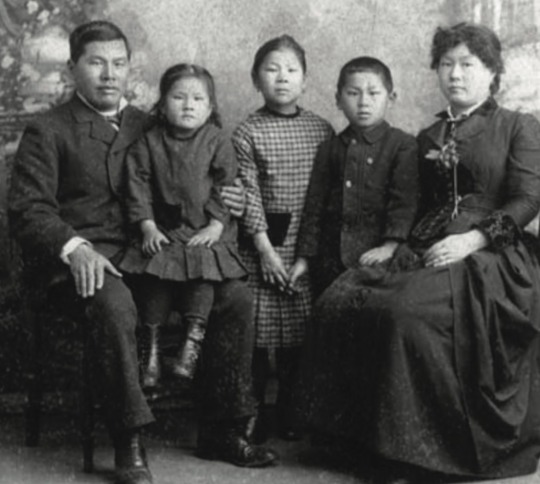
Places where I fudged the history: Frank, Mamie’s younger brother, was actually six years old and should have been more present in the comic, but I wante to keep the focus on Mamie and Mary. Also, Mamie had actually shown up to her first day of school in Western clothes. An earlier draft of the comic had a separate arc involving Mamie feeling rejected at school and Mary buying her some Chinese clothes, but that got too long and complicated.
Much of this was drawn from Mae Ngai’s book about the Tape family and their experiences as 2nd and 3rd generation Chinese Americans, titled “The Lucky Ones.”
----------
Here is Mary Tape's letter to the San Francisco School Board, 1885:
1769 Green Street.
San Francisco, April 8, 1885.
To the Board of Education -
Dear Sirs: I see that you are going to make all sorts of excuses to keep my child out off the Public schools. Dear sirs, Will you please to tell me! Is it a disgrace to be Born a Chinese? Didn’t God make us all!!! What right have you to bar my children out of the school because she is a chinese Decend. They is no other worldly reason that you could keep her out, except that. I suppose, you all goes to churches on Sundays! Do you call that a Christian act to compell my little children to go so far to a school that is made in purpose for them. My children don’t dress like the other Chinese. They look just as phunny amongst them as the Chinese dress in Chinese look amongst you Caucasians. Besides, if I had any wish to send them to a chinese school I could have sent them two years ago without going to all this trouble. You have expended a lot of the Public money foolishly, all because ofa one poor little Child. Her playmates is all Caucasians ever since she could toddle around. If she is good enough to play with them! Then is she not good enough to be in the same room and studie with them? You had better come and see for yourselves. See if the Tape’s is not same as other Caucasians, except in features. It seems no matter how a Chinese may live and dress so long as you know they Chinese. Then they are hated as one. There is not any right or justice for them.
You have seen my husband and child. You told him it wasn’t Mamie Tape you object to. If it were not Mamie Tape you object to, then why didn’t you let her attend the school nearest her home! Instead of first making one pre tense Then another pretense of some kind to keep her out? It seems to me Mr. Moulder has a grudge against this Eight-year-old Mamie Tape. I know they is no other child I mean Chinese child! care to go to your public Chinese school. May you Mr. Moulder, never be persecuted like the way you have persecuted little Mamie Tape. Mamie Tape will never attend any of the Chinese schools of your making! Never!!! I will let the world see sir What justice there is When it is govern by the Race prejudice men! Just because she is of the Chinese decend, not because she don’t dress like you because she does. Just because she is descended of Chinese parents I guess she is more of a American then a good many of you that is going to prewent her being Educated.
Mrs. M. Tape
#original comic#chinese american history#legal history#turns out there's a lot of chinese american court cases#that i have a lot of feelings about#my comic#mine
1K notes
·
View notes
Text
Hui, who founded Evergrande in 1996, was detained by Chinese police last month on “suspicion of illegal crimes” related to the debt-laden company’s financial woes.[...]
Founder Hui was once Asia’s second-richest person, having built up a personal fortune of $42 billion by 2017.
However, according to Bloomberg’s Billionaires Index, which tracks the real-time wealth of the world’s wealthiest people, Hui’s net worth has now tumbled to $979 million.
That means he has lost 98% of his wealth over the past six years.[...]
Since the Chinese government insisted that Hui use his own wealth to pay off some of Evergrande’s debts, the firm’s embattled founder and chairman has been selling off assets including a $227 million London mansion and a $112 million villa in Hong Kong.
Lol, and I can't stress this enough: lmao [25 Oct 23]
522 notes
·
View notes
Text
The horse is six feet under at this point I know but I still can't get over the gall of James Somerton correctly! arguing that Disney's lack of queer representation should be blamed solely on the company and not on the Chinese market, only to immediately fuck up any sort of logic he had in saying that by concluding that this is because China should be completely written off as a viable market because the government only lets people watch shows about communism and censors everything else 🤪 source: I shit you not, a right wing conspiracy theorist !! Since he doesn't actually know anything about the subject he's talking about, he's not actually making any arguments. He only mentions Chinese BL because the article he plagiarized did, and even then he has to punctuate it with a "audience of mostly STRAIGHT WOMEN! " of course, even though the article also acknowledges and has multiple interviews with queer Asian people who found comfort in the genre right below all the stuff he copied. There's no mention of queer Chinese artists or lesbian works or any sort of empowerment, probably because he didn't care to learn about any of them, and so rather than ending with what could have been a strong message about the persistence of queer identity even under political oppression, the video fizzles out into nothing with an aftertaste of "so Disney should just say fuck the Chinese and make whatever they want" (because yeah James sure that's the reason why Disney doesn't make gay stuff there's definitely no biases within the company itself or American culture) and "well at least we still have the Japanese and the Thai are making bl now!" Just the epitome of self-centered white saviorism. No real sympathy or respect for queer Asian struggles, just a reframing of a unique struggle with representation into "well I got mine so go get yours somewhere else" while he waits for them to spit out a work that he can regurgitate into a profit on his channel
#also he pronounced weibo as weebo#horrible. straight to the electric chair for that guy#james somerton
260 notes
·
View notes
Note
Hey man, I got the Chronivac recently and I've been testing it out. Grew my dick, made myself hairier, stuff like that. But then I tried to do a big world change. I wanted to invert stereotypes about Chinese guys, so I could see them big and hairy and dumb, you know? I think the app got stuck in a recursive loop, though, because my phone is overheating and the Chinese guys keep getting bigger and muskier all the time! Can you help me?
Oh. My. God.
You just triggered 600 million transformations. Six hundred million! One data centre has already been shut down due to overheating. And we currently have no redundancy data centre left. No offence, but I couldn't help but delete your command. Problem: Well over 10,000 transformations are already running. I have to stop them manually one by one. Or let them continue to run. As far as I could see, the transformations have gone outwards in a circle from our corporate headquarters. So all the Chinese within a radius of about eight kilometres should be affected. We should be prepared for a lot…
But first, let's talk about you. I like your transformation quite a lot. I have borrowed your settings. It's a bit stupid that the delayed start didn't work. Caught me in the middle of the team meeting.

My colleague of Chinese origin looks a bit strange… And suddenly he breaks out in a sweat. Smelly sweat. He burps and unbuttons his shirt. Asks what the fuck this is all about. And that he doesn't feel like it any more. He's going to pump iron now. Fuck, is that really hair growing on his chest?

A certain unrest arises in the corridors. More and more Chinese colleagues are suddenly standing bare-chested in the corridor, scratching the rampant fur on their chests and inhaling the stench from each other's damp and hairy armpits. The attempt to alert the security guards fails, as a good number of the colleagues are down here as well. But fortunately, my idea of calling for a protein farting competition in the company gym is successful. The hairy and smelly masses start moving.
Tonight I really had to work overtime to restore my colleagues to some degree. The priority for now is to restore sanity. One by one, they leave the gym, where the remaining ones train like crazy on the weights. It smells like a puma cage. And the smell permeates the entire building. Boy, I have a hard-on that won't let up.
Finally, it's the end of the day. Even if it sounds perverse, you now really feel like eating Chinese food. And luckily for you, most Chinese restaurants are staffed only by Vietnamese. But the usher in your favourite restaurant is actually a real Chinese. But he's not working today. He's at the gym.

There's going to be a lot of work in the next few days!
493 notes
·
View notes
Text
"[There is] fantastic news for species conservation after new populations of the gorgeous ‘Skywalker’ gibbon, known to science for only 6 years, were recently found living in the politically chaotic nation of Myanmar.
Also called the hoolock gibbon, this dainty vocalist was first described in 2017 living in the extreme south of China on a mountain in Yunnan. Classified as Endangered by the IUCN, the population was estimated to number a paltry 150 individuals, but others were believed to live in Myanmar.
Even before the recent military junta usurped the president and plunged the country into civil war, Myanmar [was a difficult place to conduct field studies, especially extensive or ongoing ones, due to ongoing conflict.]
[Although they are] now in open revolt against the military junta, [the Myanmar states of Shan and Kachin] were nevertheless destinations for an intrepid team of scientists from the Nature Conservation Society Myanmar, Fauna & Flora International–Myanmar Programme, the IUCN’s ape specialist group, and field researchers from universities in England, China, and the US.
Together, they conducted acoustic surveys, collected non-invasive DNA sampling, and took photographs for morphological identification at six sites in Kachin State and three sites in Shan State. With the help of the Myanmar conservationists, the team also interviewed locals dwelling in rural forested areas, small conservation programs, and timber companies about the frequency of sightings and the hunting pressure.
Population estimates of unknown quality and scientific rigor conducted in 2013 suggested there might be 65,000 hoolock gibbons in Myanmar, but the matter became much more complicated after the classification of the Skywalker gibbon as a separate species from the eastern hoolock gibbon—where before they were confused as the same.
“We were able to genetically identify 44 new groups of Skywalker gibbons in Myanmar,” said senior author Tierra Smiley Evans, research faculty at the UC Davis School of Veterinary Medicine, and contributing author. “This is a huge resource and success story for Myanmar.”
These gibbons sing to each other at dawn for around 22 minutes, and consume 36 different plant species; choosing fruit first, and flowers later. They seldom sleep in the same tree two nights in a row to avoid predation, and can’t swim so are often confined to territories by river systems.
The team that discovered them in China in 2017 loved Star Wars, and called them tianxing which is Chinese pinyin for “heaven movement;” a nod not only to their favorite sci-fi franchise, but also to China’s ancient history. In the famous Book of Change [aka the I Ching] of the Zhou Dynasty [1046 BCE to 265 BCE], a divination poem refers to gibbons specifically, and uses tianxing as a verb to describe their movements.
The interviews were a source of great data for the scientists. For starters, nearly all individuals in both the Kachin and Shan states could identify a Skywalker gibbon by sight and by playback of its singing, lending the exercise a good degree of reliability...
“Biologists did not believe Skywalker gibbons could live in the small remaining patches in Southern Shan State before we started this project,” Pyae Phyo Aung, executive director of Nature Conservation Society Myanmar, told the UC Davis press.
“I am delighted with our field team members who have done an excellent job, within a short period of time, building community trust for further conservation actions. This area is degraded forest. It is really important for Myanmar and China to consider extending conservation approaches for the Skywalker gibbon to this new geographic area.”
Nearly 32,000 square kilometers, or around 8 million acres of forestland in Eastern Myanmar are suitable gibbon habitat, and while existing forest reserves like Paung Taung and Mae Nei Laung are quite large, they remain unprotected. For this reason, the survey team recommended they remain considered ‘Endangered’ on the IUCN Red List until habitat protections improve."
-via Good News Network, February 21, 2024
#gibbon#apes#primates#myanmar#endangered species#china#zoology#conservation biology#conservation news#primatology#good news#hope
148 notes
·
View notes
Text
In light of Fall Out Boy’s GARBAGE cover of the song. Let’s learn about the original. Notice how they’re actually in chronological order instead of just random references 😒😒😒😒
1949
Harry Truman was inaugurated as U.S. president after being elected in 1948 to his own term; previously he was sworn in following the death of Franklin D. Roosevelt. He authorized the use of atomic bombs on Hiroshima and Nagasaki in Japan during World War II, on August 6 and August 9, 1945, respectively.
Doris Day enters the public spotlight with the films My Dream Is Yours and It’s a Great Feeling as well as popular songs like “It’s Magic”; divorces her second husband.
Red China: The Communist Party of China wins the Chinese Civil War, establishing the People’s Republic of China.
Johnnie Ray signs his first recording contract with Okeh Records, although he would not become popular for another two years.
South Pacific, the prize-winning musical, opens on Broadway on April 7.
Walter Winchell is an aggressive radio and newspaper journalist credited with inventing the gossip column.
Joe DiMaggio and the New York Yankees go to the World Series five times in the 1940s, winning four of them.
1950
Joe McCarthy, the US Senator, gains national attention and begins his anti-communist crusade with his Lincoln Day speech.
Richard Nixon is first elected to the United States Senate.
Studebaker, a popular car company, begins its financial downfall.
Television is becoming widespread throughout Europe and North America.
North Korea and South Korea declare war after Northern forces stream south on June 25.
Marilyn Monroe soars in popularity with five new movies, including The Asphalt Jungle and All About Eve, and attempts suicide after the death of friend Johnny Hyde who asked to marry her several times, but she refused respectfully. Monroe would later (1954) be married for a brief time to Joe DiMaggio (mentioned in the previous verse).
1951
The Rosenbergs, Ethel and Julius, were convicted on March 29 for espionage.
H-Bomb is in the middle of its development as a nuclear weapon, announced in early 1950 and first tested in late 1952.
Sugar Ray Robinson, a champion welterweight boxer.
Panmunjom, the border village in Korea, is the location of truce talks between the parties of the Korean War.
Marlon Brando is nominated for the Academy Award for Best Actor for his role in A Streetcar Named Desire.
The King and I, musical, opens on Broadway on March 29.
The Catcher in the Rye, a controversial novel by J. D. Salinger, is published.
1952
Dwight D. Eisenhower is first elected as U.S. president, winning by a landslide margin of 442 to 89 electoral votes.
The vaccine for polio is privately tested by Jonas Salk.
England’s got a new queen: Queen Elizabeth II succeeds to the throne upon the death of her father, George VI, and is crowned the next year.
Rocky Marciano defeats Jersey Joe Walcott, becoming the world Heavyweight champion.
Liberace has a popular 1950s television show for his musical entertainment.
Santayana goodbye: George Santayana, philosopher, essayist, poet, and novelist, dies on September 26.
1953
Joseph Stalin dies on March 5, yielding his position as leader of the Soviet Union.
Georgy Maksimilianovich Malenkov succeeds Stalin for six months following his death. Malenkov had presided over Stalin’s purges of party “enemies”, but would be spared a similar fate by Nikita Khrushchev mentioned later in verse.
Gamal Abdel Nasser acts as the true power behind the new Egyptian nation as Muhammad Naguib’s minister of the interior.
Sergei Prokofiev, the composer, dies on March 5, the same day as Stalin.
Winthrop Rockefeller and his wife Barbara are involved in a highly publicized divorce, culminating in 1954 with a record-breaking $5.5 million settlement.
Roy Campanella, an African-American baseball catcher for the Brooklyn Dodgers, receives the National League’s Most Valuable Player award for the second time.
Communist bloc is a group of communist nations dominated by the Soviet Union at this time. Probably a reference to the Uprising of 1953 in East Germany.
1954
Roy Cohn resigns as Joseph McCarthy’s chief counsel and enters private practice with the fall of McCarthy. He also worked to prosecute the Rosenbergs, mentioned earlier.
Juan Perón spends his last full year as President of Argentina before a September 1955 coup.
Arturo Toscanini is at the height of his fame as a conductor, performing regularly with the NBC Symphony Orchestra on national radio.
Dacron is an early artificial fiber made from the same plastic as polyester.
Dien Bien Phu falls. A village in North Vietnam falls to Viet Minh forces under Vo Nguyen Giap, leading to the creation of North Vietnam and South Vietnam as separate states.
“Rock Around the Clock” is a hit single released by Bill Haley & His Comets in May, spurring worldwide interest in rock and roll music.
1955
Albert Einstein dies on April 18 at the age of 76.
James Dean achieves success with East of Eden and Rebel Without a Cause, gets nominated for an Academy Award for Best Actor, and dies in a car accident on September 30 at the age of 24.
Brooklyn’s got a winning team: The Brooklyn Dodgers win the World Series for the only time before their move to Los Angeles.
Davy Crockett is a Disney television miniseries about the legendary frontiersman of the same name. The show was a huge hit with young boys and inspired a short-lived “coonskin cap” craze.
Peter Pan is broadcast on TV live and in color from the 1954 version of the stage musical starring Mary Martin on March 7. Disney released an animated version the previous year.
Elvis Presley signs with RCA Records on November 21, beginning his pop career.
Disneyland opens on July 17, 1955 as Walt Disney’s first theme park.
1956
Brigitte Bardot appears in her first mainstream film And God Created Woman and establishes an international reputation as a French “sex kitten”.
Budapest is the capital city of Hungary and site of the 1956 Hungarian Revolution.
Alabama is the site of the Montgomery Bus Boycott which ultimately led to the removal of the last race laws in the USA. Rosa Parks and Martin Luther King, Jr figure prominently.
Nikita Khrushchev makes his famous Secret Speech denouncing Stalin’s “cult of personality” on February 25.
Princess Grace Kelly releases her last film, High Society, and marries Prince Rainier III of Monaco.
Peyton Place, the best-selling novel by Grace Metalious, is published. Though mild compared to today’s prime time, it shocked the reserved values of the 1950s.
Trouble in the Suez: The Suez Crisis boils as Egypt nationalizes the Suez Canal on October 29.
1957
Little Rock, Arkansas is the site of an anti-integration standoff, as Governor Orval Faubus stops the Little Rock Nine from attending Little Rock Central High School and President Dwight D. Eisenhower deploys the 101st Airborne Division to counteract him.
Boris Pasternak, the Russian author, publishes his famous novel Doctor Zhivago.
Mickey Mantle is in the middle of his career as a famous New York Yankees outfielder and American League All-Star for the sixth year in a row.
Jack Kerouac publishes his first novel in seven years, On the Road.
Sputnik becomes the first artificial satellite, launched by the Soviet Union on October 4, marking the start of the space race.
Chou En-Lai, Premier of the People’s Republic of China, survives an assassination attempt on the charter airliner Kashmir Princess.
Bridge on the River Kwai is released as a film adaptation of the 1954 novel and receives seven Academy Awards, including Best Picture.
1958
Lebanon is engulfed in a political and religious crisis that eventually involves U.S. intervention.
Charles de Gaulle is elected first president of the French Fifth Republic following the Algerian Crisis.
California baseball begins as the Brooklyn Dodgers and New York Giants move to California and become the Los Angeles Dodgers and San Francisco Giants. They are the first major league teams west of Kansas City.
Charles Starkweather Homicide captures the attention of Americans, in which he kills eleven people between January 25 and 29 before being caught in a massive manhunt in Douglas, Wyoming.
Children of Thalidomide: Mothers taking the drug Thalidomide had children born with congenital birth defects caused by the sleeping aid and antiemetic, which was also used at times to treat morning sickness.
1959
Buddy Holly dies in a plane crash on February 3 with Ritchie Valens and The Big Bopper, in a day that had a devastating impact on the country and youth culture. Joel prefaces the lyric with a Holly signature vocal hiccup: “Uh-huh, uh-huh.”
Ben-Hur, a film based around the New Testament starring Charlton Heston, wins eleven Academy Awards, including Best Picture.
Space Monkey: Able and Miss Baker return to Earth from space aboard the flight Jupiter AM-18.
The Mafia are the center of attention for the FBI and public attention builds to this organized crime society with a historically Sicilian-American origin.
Hula hoops reach 100 million in sales as the latest toy fad.
Fidel Castro comes to power after a revolution in Cuba and visits the United States later that year on an unofficial twelve-day tour.
Edsel is a no-go: Production of this car marque ends after only three years due to poor sales.
1960
U-2: An American U-2 spy plane piloted by Francis Gary Powers was shot down over the Soviet Union, causing the U-2 Crisis of 1960.
Syngman Rhee was rescued by the CIA after being forced to resign as leader of South Korea for allegedly fixing an election and embezzling more than US $20 million.
Payola, illegal payments for radio broadcasting of songs, was publicized due to Dick Clark’s testimony before Congress and Alan Freed’s public disgrace.
John F. Kennedy beats Richard Nixon in the November 8 general election.
Chubby Checker popularizes the dance The Twist with his cover of the song of the same name.
Psycho: An Alfred Hitchcock thriller, based on a pulp novel by Robert Bloch and adapted by Joseph Stefano, which becomes a landmark in graphic violence and cinema sensationalism. The screeching violins heard briefly in the background of the song are a trademark of the film’s soundtrack.
Belgians in the Congo: The Republic of the Congo (Leopoldville) was declared independent of Belgium on June 30, with Joseph Kasavubu as President and Patrice Lumumba as Prime Minister.
1961
Ernest Hemingway commits suicide on July 2 after a long battle with depression.
Adolf Eichmann, a “most wanted” Nazi war criminal, is traced to Argentina and captured by Mossad agents. He is covertly taken to Israel where he is put on trial for crimes against humanityin Germany during World War II, convicted, and hanged.
Stranger in a Strange Land, written by Robert A. Heinlein, is a breakthrough best-seller with themes of sexual freedom and liberation.
Bob Dylan is signed to Columbia Records after a New York Times review by critic Robert Shelton.
Berlin is separated into West Berlin and East Berlin, and from the rest of East Germany, when the Berlin Wall is erected on August 13 to prevent citizens escaping to the West.
The Bay of Pigs Invasion fails, an attempt by United States-trained Cuban exiles to invade Cuba and overthrow Fidel Castro.
1962
Lawrence of Arabia: The Academy Award-winning film based on the life of T. E. Lawrence starring Peter O’Toole premieres in America on December 16.
British Beatlemania: The Beatles, a British rock group, gain Ringo Starr as drummer and Brian Epstein as manager, and join the EMI’s Parlophone label. They soon become the world’s most famous rock band, with the word “Beatlemania” adopted by the press for their fans’ unprecedented enthusiasm. It also began the British Invasion in the United States.
Ole’ Miss: James Meredith integrates the University of Mississippi
John Glenn: Flew the first American manned orbital mission termed “Friendship 7” on February 20.
Liston beats Patterson: Sonny Liston and Floyd Patterson fight for the world heavyweight championship on September 25, ending in a first-round knockout. This match marked the first time Patterson had ever been knocked out and one of only eight losses in his 20-year professional career.
1963
Pope Paul VI: Cardinal Giovanni Montini is elected to the papacy and takes the papal name of Paul VI.
Malcolm X makes his infamous statement “The chickens have come home to roost” about the Kennedy assassination, thus causing the Nation of Islam to censor him.
British politician sex: The British Secretary of State for War, John Profumo, has a relationship with a showgirl, and then lies when questioned about it before the House of Commons. When the truth came out, it led to his own resignation and undermined the credibility of the Prime Minister.
JFK blown away: President John F. Kennedy is assassinated on November 22 while riding in an open convertible through Dallas.
1965
Birth control: In the early 1960s, oral contraceptives, popularly known as “the pill”, first go on the market and are extremely popular. Griswold v. Connecticut in 1965 challenged a Connecticut law prohibiting contraceptives. In 1968, Pope Paul VI released a papal encyclical entitled Humanae Vitae which declared artificial birth control a sin.
Ho Chi Minh: A Vietnamese communist, who served as President of Vietnam from 1954–1969. March 2 Operation Rolling Thunder begins bombing of the Ho Chi Minh Trail supply line from North Vietnam to the Vietcong rebels in the south. On March 8, the first U.S. combat troops, 3,500 marines, land in South Vietnam.
1968
Richard Nixon back again: Former Vice President Nixon is elected President in 1968.
1969
Moonshot: Apollo 11, the first manned lunar landing, successfully lands on the moon.
Woodstock: Famous rock and roll festival of 1969 that came to be the epitome of the counterculture movement.
1974–75
Watergate: Political scandal that began when the Democratic National Committee’s headquarters at the Watergate office complex in Washington, DC was broken into. After the break-in, word began to spread that President Richard Nixon (a Republican) may have known about the break-in, and tried to cover it up. The scandal would ultimately result in the resignation of President Nixon, and to date, this remains the only time that anyone has ever resigned the United States Presidency.
Punk rock: The Ramones form, with the Sex Pistols following in 1975, bringing in the punk era.
1976–77
(An item from 1977 comes before three items from 1976 to make the song scan.)
Menachem Begin becomes Prime Minister of Israel in 1977 and negotiates the Camp David Accords with Egypt’s president in 1978.
Ronald Reagan was elected President of the United States in 1980, but he first attempted to run for the position in 1976.
Palestine: a United Nations resolution that calls for an independent Palestinian state and to end the Israeli occupation.
Terror on the airline: Numerous aircraft hijackings take place, specifically, the Palestinian hijack of Air France Flight 139 and the subsequent Operation Entebbe in Uganda.
1979
Ayatollah’s in Iran: During the Iranian Revolution of 1979, the West-backed and secular Shah is overthrown as the Ayatollah Ruhollah Khomeini gains power after years in exile and forces Islamic law.
Russians in Afghanistan: Following their move into Afghanistan, Soviet forces fight a ten-year war, from 1979 to 1989.
1983
Wheel of Fortune: A hit television game show which has been TV’s highest-rated syndicated program since 1983.
Sally Ride: In 1983 she becomes the first American woman in space. Ride’s quip from space “Better than an E-ticket”, harkens back to the opening of Disneyland mentioned earlier, with the E-ticket purchase needed for the best rides.
Heavy metal suicide: In the 1980s Ozzy Osbourne and the bands Judas Priest and Metallica were brought to court by parents who accused the musicians of hiding subliminal pro-suicide messages in their music.
Foreign debts: Persistent U.S. trade deficits
Homeless vets: Veterans of the Vietnam War, including many disabled ex-military, are reported to be left homeless and impoverished.
AIDS: A collection of symptoms and infections in humans resulting from the specific damage to the immune system caused by infection with the human immunodeficiency virus (HIV). It is first detected and recognized in the 1980s, and was on its way to becoming a pandemic.
Crack cocaine use surged in the mid-to-late 1980s.
1984
Bernie Goetz: On December 22, Goetz shot four young men who he said were threatening him on a New York City subway. Goetz was charged with attempted murder but was acquitted of the charges, though convicted of carrying an unlicensed gun.
1988
Hypodermics on the shore: Medical waste was found washed up on beaches in New Jersey after being illegally dumped at sea. Before this event, waste dumped in the oceans was an “out of sight, out of mind” affair. This has been cited as one of the crucial turning points in popular opinion on environmentalism.
1989
China’s under martial law: On May 20, China declares martial law, enabling them to use force of arms against protesting students to end the Tiananmen Square protests.
Rock-and-roller cola wars: Soft drink giants Coke and Pepsi each run marketing campaigns using rock & roll and popular music stars to reach the teenage and young adult demographic.
Short summaries of all 119 references mentioned in the song, you’re welcome.
#look fall out boy is one of my fave bands but this is inexcusable#fall out boy#Billy Joel#music#Spotify
291 notes
·
View notes
Text
Shizuroth, part ten.
(previous parts: one, two, three, four, five, six, seven, eight, nine)
-
So much for his day off! Well, maybe expecting to get a day off so soon into a new transmigration was a bit of a big ask, but still - he'd been geared up for a day on the couch, catching up with his emails and reading through the whole tutorial section on his phone!
Which, it turns out, was actually useful once you got past the glaringly obvious and downright condescending parts. It actually explained to him where to pick up the orders he'd been making - and he'd learned a whole bunch about the SOLDIER program and the Wutai war and stuff like Materia. Very useful, and he was only halfway through it - he'd gotten distracted by the mailing lists, which were actually really interesting! Very informative in the terms of lore!
There was so much to catch up on, and he'd been looking forward to a whole day of reading and meditating, now that the Feng Shui wasn't quite so rancid. If he'd known he'd end up having guests, he would've put on some actual clothes too!
Ugh, he would really miss the convenience of having disciples. Having a barrier between himself and guests let him make himself presentable, whenever his me-time got distributed. Never mind he could just tell them, no, this master isn't accepting visitors at this time, and they'd politely sent them away without him having to do anything! So useful!
And now he's here, inhabiting a Big Bad - reduced to making his own tea and everything.
"What are you doing?" Genesis asks, watching him dubiously.
Isn't it obvious? "I am making tea," as you should be able to tell, from the tea pot!
His guests share a pointed look, and he suppresses the urge to roll Sephiroth's eyes. Like he can't see them.
"Here, let me help you with that -" the big beefy one, Angeal, begins to say, only to stop at his scoff.
"If your tea making abilities are on par with Genesis, no thank you," he says in a tone that probably has too much Qing Jing Peak Lord and not enough One-Winged Angel in it. "I got it."
"What's wrong with my tea making?" Genesis asks. "It's tea. You dunk it in hot water until it becomes brown, and then you drink it."
Genesis-bro, you're lucky it's not Shen Jiu you're facing - you'd be wearing the tea. "Hm," the version of Shen Qingqiu that is there answers wryly and pours the first cup into the sink before carrying the pot and cups to the kitchen table.
Note to self - trays, he needs at least one tea tray.
There's an awkward, confused silence as he serves the tea. "Apologies for the lack of snacks," he says and adds, pointedly, "I wasn't expecting company."
"You never are," Genesis mutters, giving his teacup an aggravated look.
"Thank you, Sephiroth," Angeal says and accepts the cup. It looks tiny in his hands, and he doesn't seem to know what to do with it. "Is this… a Wutai practice?"
Hell if he knows, though seeing as Wutai was a sort of mishmash of Chinese and Japanese aesthetic, they probably had some kind of tea culture.
"Perhaps," he says and sips his tea. "So, what can I do for you two?"
Another look shared between them. They sip their tea and then look insultingly surprised when it's not awful.
"...I heard about what happened in the labs," Angeal says, turning the cup in his hand. "Genesis told me. Are you… alright?"
Well, his core is still a puddle of cement, and by his estimation it will be weeks of cultivation before he can work on something useful. He's stuck in the body of another villain doomed to die - and resurrect, and die, and resurrect, and die… but at least it comes with a built-in excuse for inconvenient amnesia plots! This world still doesn't have the internet - but it has fast food and online shopping! He still has a wallet full of hefty, big numbers! And, one can't forget, he's an incredibly hot beefcake of a man, strongest in the setting… at least until Cloud Strife would come along!
Compared to Shen Qingqiu, Sephiroth doesn't have much to complain about. At least he doesn't have to look forward to being torn limb from limb and tortured to slow and agonising death!
He thinks briefly of Binghe and then shakes his head.
"I'm fine," he says.
Another shared, pointed, knowing look.
"You know that's not going to cut it, right?" Genesis says, setting his cup down. "Have you figured out how much you've forgotten?"
Everything and nothing. Once more.
Awkward.
"Sephiroth," Angeal says, looking at him seriously. "We're here to help you. Please, trust us - it's our duty, as your friends, to help you."
The man looks and sounds a lot like Yue Qingyuan in that moment. Sans the guilt and indulgence, but the vibes are very familiar. And, like with Yue Qingyuan, they kind of rub him the wrong way.
"Pretty sure friendship isn't supposed to be based on duty," he says, giving the man a look.
"Well, it's quicker and easier to say - and a little less likely to give you hives than the actual truth," Angeal points out.
"... Which is?"
Angeal dons on a very serious and very sincere expression. "Sephiroth," he says. "You're our friend, we're your friends, and we care about you. We're worried about you. Please believe us, we're here for you."
He instantly recoils away from that utter anime bullshit, and then glares as Genesis laughs at him. It's just so - ugh! "Next you will be telling me with the power of friendship I will regain my lost self," Sephiroth mutters. "Or that the first step to healing is accepting I have a problem. What is this, a damn intervention?" Oh, shit, maybe this is the Kingdom Hearts version after all!
"Goddess, don't give him ideas!" Genesis snorts. "His lectures are bad enough already!"
Angeal looks a little relieved, for some reason, and leans back. "And so my point is made," he says, satisfied, and folds his arms. "And my question still stands. Are you, really, alright?"
Ugh. "I feel fine."
"But are you? Are you fit for duty? If they send you to Wutai, will you be alright?"
Oh. Oh, that would be convenient, if he could use this whole thing as an excuse not to go! "If I say no, they won't send me to Wutai?"
Angeal frowns, hesitant.
"Oh, they'll still send you. But maybe not alone," Genesis says. "Probably one of us, or a bunch of Seconds, will be sent as your backup. But we'll still need to know what we might be covering you for."
He's not sure what that means, and it must show on his face, because Angeal explains. "If you, for example, have forgotten certain protocols… whoever goes in as your second will need to know when to step in."
Oh. "That seems…" he's not actually sure. Kinda bad? "If I don't know the protocols, then I shouldn't go, surely?"
"Oh, to see the day when reason and logic will find footing in Shinra military," Genesis sighs and shakes his head. "You could've had your brain completely fried, and they'll still send you, so long as you can still fight. Hell, they'll send you just to look pretty, even if you can't!"
… well, great, that's just great.
Angeal looks worried. "Can you still fight?"
Fight? Yes, probably. Fight like Sephiroth? Hmm…
He looks at the sword in the stand, now placed strategically so that it directs the room's energy properly. It has at least half a metre on Xiu Ya, and it's curved besides. And, obviously, it's not a spiritual sword.
"Perhaps we should find out," Genesis suggests, a gleam in his eyes. "Right. Who's up for sneaking into the company training room?
-
SY of the Wife Beam: oh no, Anime Friendship Speeches, this is so unrealistic.
332 notes
·
View notes
Text
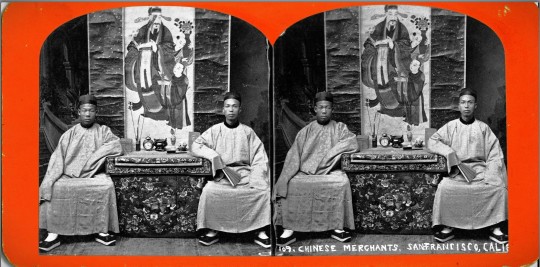
“109. Chinese Merchants, San Francisco, Calif.” c. 1890 – 1899? Stereograph by Nesemann Woods Gallery, Marysville CA (from the Wallace B. Chung and Madeline H. Chung Collection of the University of British Columbia Library).
Merchants of Old Chinatown
In the late 1840s and the 1850s, Chinese merchants and traders made their initial foray into California. By February 1849, the number of Chinese had increased to 54 and by January 1850, historians would count 787 men and two women in San Francisco. In December 1849, the Alta California newspaper reported that 300 Chinese convened a meeting at the Canton Restaurant on Jackson Street for the purpose of organizing the “Chinese residents of San Francisco” and engaging the services of lawyer Selim E. Woodsworth to “act in the capacity and adviser for them.”
In his book, Genthe’s Photographs of San Francisco’s Old Chinatown, historian John Tchen wrote about the vanguard of old San Francisco Chinatown’s merchant elite as follows:
“These pioneers hailed primarily from the Sanyi (Saam Yap) or Three Districts [三邑], as well as the Zhongshan area in the immediate vicinity of Canton. It's important to note that Nanhai (Namhoi) and Panyu (Punyu) stood out as the most prosperous districts within Guangdong Province. Their economic pursuits ran the gamut from cultivating fertile agricultural lands, breeding silkworms and fish, to crafting silk textiles, producing ceramics for both domestic and international markets, and engaging in various other commercial endeavors.
“What set apart the merchants and artisans from Sanyi and Zhongshan was their mastery of a more refined city dialect compared to their Siyi (Sei Yap) counterparts, who mainly consisted of poorer, rural communities. Remarkably, over 80 percent of Chinese immigrants in North America originated from the Siyi [四邑] region. A noteworthy portion of these Sanyi merchants belonged to the emerging class of compradores, individuals who facilitated business transactions on behalf of Western trading companies. These California-based Sanyi merchants thus brought prior experience in dealings with Western entrepreneurs, and California was seen as a promising arena to expand these lucrative connections.”
With the completion of the Transcontinental Railroad in May of 1869, the more sophisticated and adventurous members of San Francisco’s pioneer Chinese merchant community would begin exploring other cities in the United States in search of opportunity.
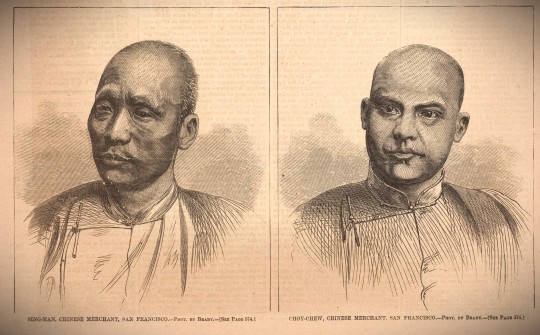
“Sing-Man, Chinese Merchant, San Francisco” and “Choy-Chew, Chinese Merchant, San Francisco,” Harper’s Weekly, September 4, 1869, wood engraving on paper. Artist unknown, artist after a photograph by Mathew Brady, 1869 (from the collection of the National Portrait Gallery).
For example, in the Harper’s Weekly article (Sept 4, 1869, page 574), the reporter identified merchant Choy Chew as a San Franciscan and a talented linguist of sufficient intellect and stature to be invited to give a speech at a European-American banquet. He reportedly visited Chicago with a fellow merchant, Sing Man, before traveling to New York where the pair were regarded as “representatives of Chinese industry and commerce.”
At the banquet in Chicago, Choy Chew delivered the following remarks:
”Eleven years ago I came from my home to seek my fortune in your great Republic. I landed on the golden shore of California, utterly ignorant of your language, unknown to any of your people, a stranger to your customs and laws, and in the minds of some an intruder — one of that race whose presence is deemed a positive injury to the public prosperity. But gentlemen, I found both kindness and justice. I found that above the prejudice that had been formed against us, that the hand of friendship was extended to the people of every nation, and that even Chinamen must live, be happy, successful and respected in ‘free America.’ I gathered knowledge in your public schools; I learned to speak as you do; and, gentlemen, I rejoice that it is so; that I have been able to cross this vast continent without the aid of an interpreter; that here in the heart of the United States I can speak to you in your own familiar speech, and tell you how much, how very much, I appreciate your hospitality; how grateful I feel for the privileges and advantages I have enjoyed in your glorious country; and how earnestly I hope that your example of enterprise, energy, vitality, and national generosity may be seen and understood, as I see and understand it, by our Government …
”We trust our visit, gentlemen, may be productive of good results to all of us; that the two great countries, East and West, China and America, may be found forever together in friendship, and that a Chinaman in America, or an American in China, may find like protection and like consideration in their search for happiness and wealth.“
-- from the Scientific American, new series, vol. 21, no. 9, p. 131 (August 28, 1869)
The founding in 1888 of the Merchants’ Exchange in old San Francisco Chinatown represented the logical culmination of several decades of robust business operations by the pioneer Chinese merchants in the city and beyond.
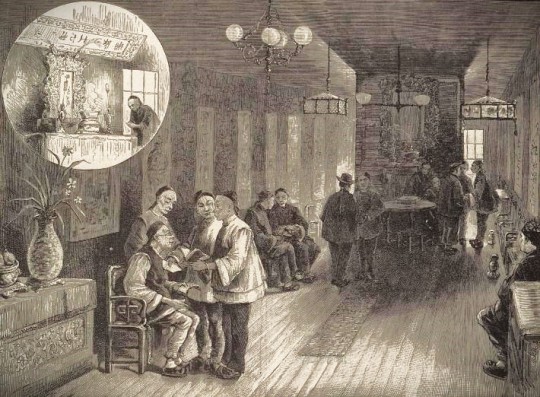
“Chinese Merchants’ Exchange, San Francisco.” Lithograph from Harper’s Weekly, Vol. 26, March 18, 1882 (from the collection of The Bancroft Library, University of California, Berkeley.
In his book, A Guide Book to San Francisco (published by The Bancroft Company in 1888), John S. Hittell described the Chinese Merchants Exchange as follows:
“At 739 Sacramento Street are the new rooms of the Chinese Merchants' Exchange. They are fitted up in the ordinary Chinese style, and though presenting no special attraction to the visitor, the business transacted there is of considerable importance. A Chinese merchant, contractor, or speculator never starts on any enterprise alone. He always has at least one partner, and in most cases several. He makes no secret of his transactions, but converses about them at the exchange, and often goes there in search of capital when his own means are insufficient. He sometimes applies to that institution to find him a capable man to manage a new business which he is about to start. If, as often happens, one be selected who is in debt to other members, they make arrangements which will not interfere with the new enterprise; and the debtor is not unfrequently released from his obligations.”
Fung Tang
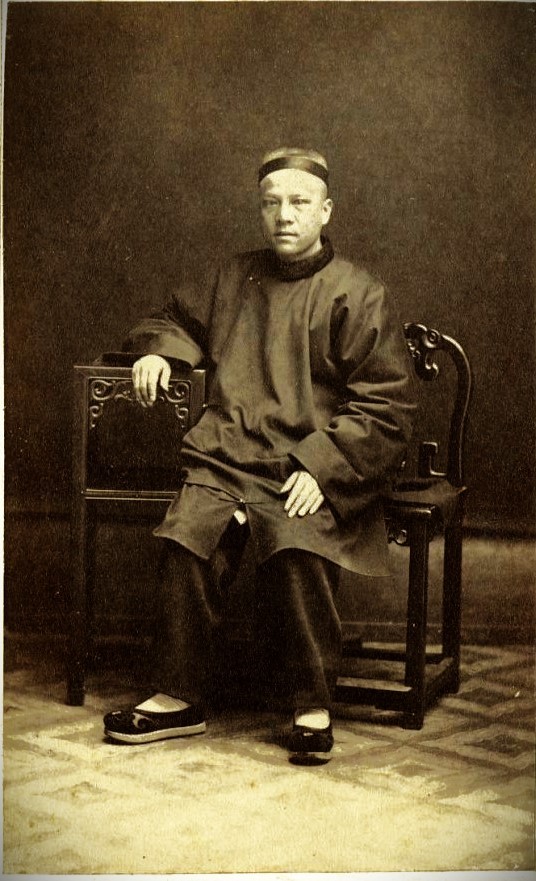
Fung Tang, c. 1870. Photo by Kai Suck (from the collection of the California Historical Society).
The address of the Merchants’ Exchange at 739 Sacramento Street was hardly surprising, as it shared the same building which had housed the mercantile house of a legendary merchant, Fung Tang. Historian York Lo, in his article for The Industrial History of Hong Kong Group website, described Fung as “a native of Jiujiang (Kow Kong) in the Nanhai county (南海九江) in Guangdong, Fung Tang followed his uncle Fung Yuen-sau (馮元秀) to California in 1857 at the age of 17 and worked at Tuck Chong & Co (德祥號辦莊), a trading business founded by his uncle and his fellow Nanhai native Kwan Chak-yuen (關澤元).” In the Langley San Francisco directory of 1868, the Tuck Chong & Co. is listed as “(Chinese) merchants” located on Chinatown’s first main street at 739 Sacramento Street.
“In his spare time,” York Lo writes, “he learned English from Reverend William Speer and became fluent in the language. With his linguistic skills, he became a bridge between the Chinese and the white community in San Francisco and even befriended Peter Burnett, the first Governor of California, who described Fung in his memoir as ’a cultivated man, well read in the history of the world, spoke four or five different languages fluently including English, and was a most agreeable gentleman, of easy and pleasing manners’.”
As such, Fung Tang must be considered as a logical client for the pioneer Chinatown photographer, Kai Suck. A professional studio portrait would have conferred respectability in the eyes of the non-Chinese businessmen and politicians with whom he interacted. In fact, Fung appears to have deployed the same portrait now reposing in the collection of the California Historical Society as part of his commercial advertising in Hong Kong.
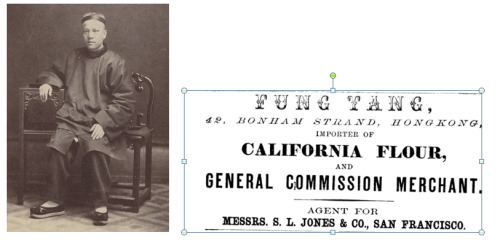
An advertisement for Fung Tang’s flour import business in the Sheung Wan district of Hong Kong.
For more details about Fung’s business exploits and his public service, including his election to the board of directors of the Tung Wah clinic (the original predecessor organization of the future Chinese Hospital), readers are encouraged to read York Lo’s piece here: https://industrialhistoryhk.org/fung-tang-the-firm-the-family-the-transpacific-metals-trade-and-tin-refinery/?fbclid=IwAR3DU6pEcaEw6w2uH1OZvFBFL8vg-Rl4keBS-VkbcttFuHKlx973g3ZjcY8
Tchen asserts that the influx of British and other Western imperialist powers into China’s major treaty ports transformed the status of merchants engaged with Western trading companies. Rather than operating on the margins of Qing-era society, the merchants gained unprecedented prestige and influence. Beyond China's borders, they experienced far more freedom to engage in trade and amass substantial profits without the worry of state-imposed restrictions. They rapidly acquired the necessary language skills and business acumen to navigate their newfound opportunities.
San Francisco’s early Chinese merchants swiftly grasped the English language and American business practices, excelling in American-style transactions, and developing strategies for fostering positive relations with the general San Francisco populace. The local press affectionately labeled them "China Boys." They made conscious efforts to participate in the celebrations of significant American holidays, further endearing themselves to the San Francisco community.
This approach significantly bolstered their rapport with the local population, as evidenced by the California Courier's glowing praise: “We have never seen a finer-looking body of men collected together in San Francisco. In fact, this portion of our population is a pattern for sobriety, order, and obedience to laws, not only to other foreign residents, but to Americans themselves," declared Cornelius B. S. Gibbs, a marine-insurance adjuster, in 1877. Gibbs emphasized the high esteem in which Chinese merchants were held among white business circles. “As men of business, I consider that the Chinese merchants are fully equal to our merchants. As men of integrity, I have never met a more honorable, high-minded, correct, and truthful set of men than the Chinese merchants of our city.”
Attempts to participate in mainstream society, however, were not always welcomed by lower-class elements of white society as evident in this news account about Fung Tang’s appearance in San Francisco’s California Theatre in September 1869:
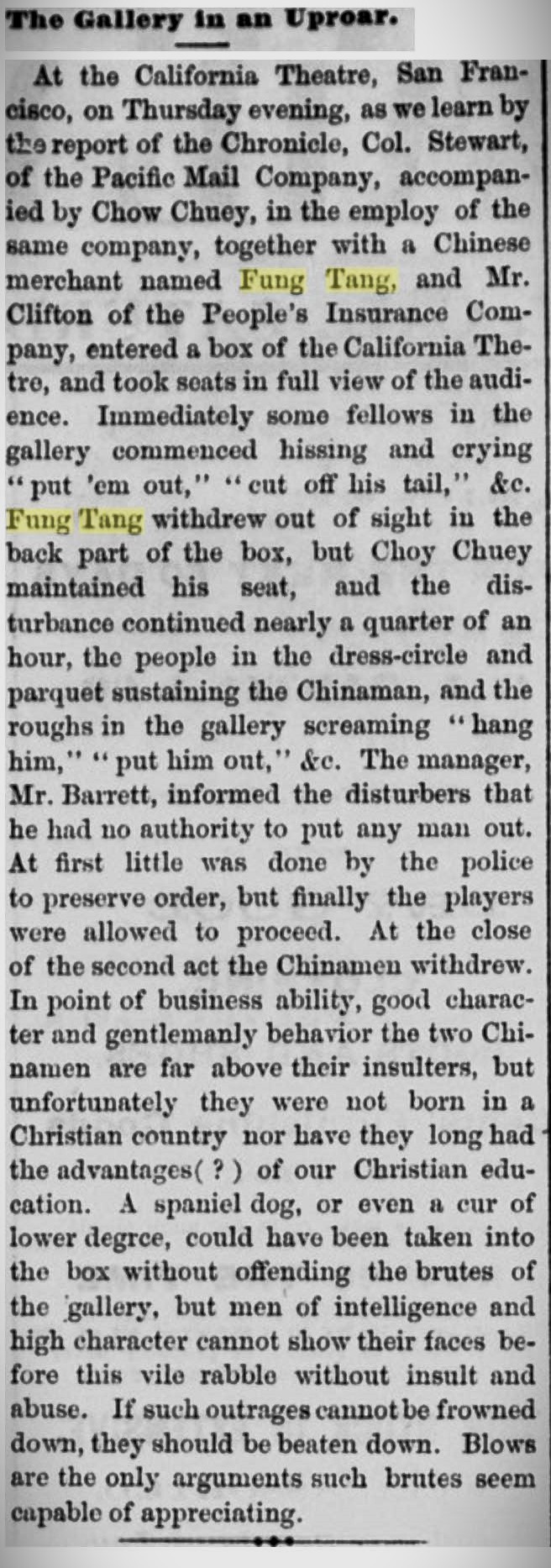
Clipping from the San Jose Mercury News, September 18, 1869 (vol. I no. 42)
Fung Tang’s transpacific success in San Francisco was hardly unique among the ranks of Chinatown’s early merchant class. He exemplified the business acumen of his fellow pioneering entrepreneurs and their establishment of transpacific trading posts in strategic locations.
Lai Chun-chuen and Chy Lung Co.
The story of the pioneer business of Chy Lung & Co. predates the history of San Francisco Chinatown itself, and its establishment spurred the rise of Chinatown’s first commercial strip, Sacramento Street (唐人街; canto: “Tohng Yahn Gaai”) or “Chinese Street.”
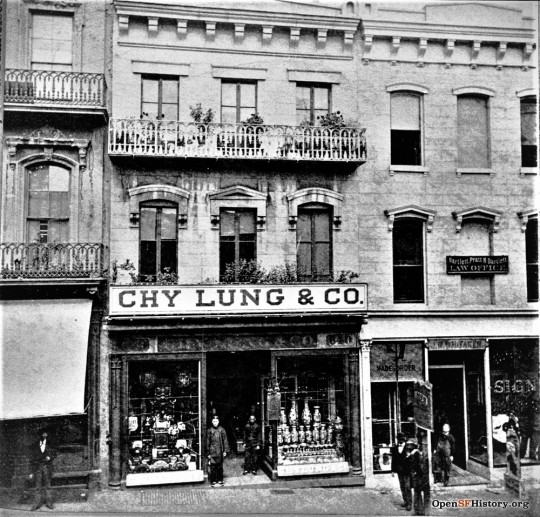
An enlargement of the stereograph taken by Carleton Watkins for the Thomas Houseworth & Co., and “[e]ntered according to Act of Congress, in the year 1866 by Lawrence & Houseworth, in the Clerk’s office of the District Court of the United States, for the Northern District of California.”
“Among the early Chinese settlers were merchants like Lai Chu[sic]-chuen,” the late historian Judy Yung wrote in her pictorial book, San Francisco���s Chinatown (published by the Chinese Historical Society of America). “Upon arrival in 1850, he opened Chinatown’s first Bazaar at 640 Sacramento Street, importing teas, opium, silk, lacquered goods, and Chinese groceries.”
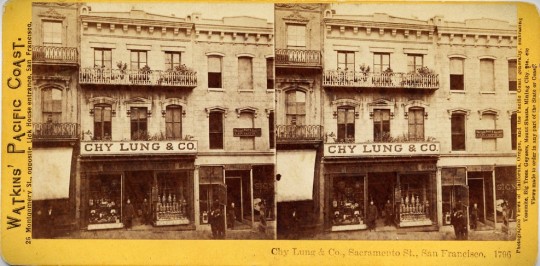
"Chy Lung & Co., Sacramento St., San Francisco. 1796" c. 1866. Photograph by Carleton Watkins for his Watkins' Pacific Coast stereograph series (from a private collection).
Chy Lung’s founder, Lai Chun-chuen (a.k.a. Chung Lock), came to San Francisco in 1850 from Nam Hoi county. According to UC professor Yong Chen, the business founded by Lai and, his partners Xie Mingli, Fang Ren, Sheng Wen, and Chen Nu, appear in the earliest business directories for San Francisco. A “Chyling, china mer, 188 Washington” appears in the Parker directory for 1852-1853. The Colville’s directory of 1856 lists a “Chy Lung (Chinese) mcht, Canton Silk and Shawl Store, 166 Wash’n,” and the business would remain on Washington Street (moving to 612 Washington St. by 1858) until 1863 when it relocated to 642 Sacramento Street. By 1865, the Chy Lung & Co. had either expanded or taken over the address of 640 Sacramento Street.
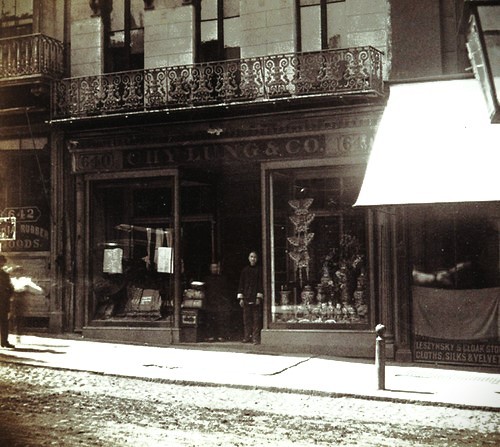
Portion of the stereograph “No. 391 Chinese Store. Chy Lung & Co.,” c. 1866. Published by Lawrence & Houseworth (from in the collections of the Society of California Pioneers, Wells Fargo Corporate Archives, and the Library of Congress).
“He imported Chinese prefabricated houses and cargoes of Chinese goods, teas, silk, lacquer and Porcelain wears, and even opium,” historian Phil Choy wrote. “The drug that made American merchants millionaires in the China trade now found its way to California for both the Chinese and American markets Chy Lung was one of only two Chinese businesses at the time that advertised in an American newspaper, the Daily Alta California.”

“No. 391 Chinese Store. Chy Lung & Co., Sacramento Street.” c. 1866. Published by Thomas Houseworth & Co. (from in the collection of the New York Public Library).
Lai Chun-chuen is remembered not only for his business acumen but also as the principal author of the objections to the anti-Chinese movement in California and plea for civil rights as published in the pamphlet, Remarks of the Chinese Merchants of San Francisco, upon Governor Bigler’s Message, and Some Common Objections (San Francisco: Whitton, Towne, 1855).
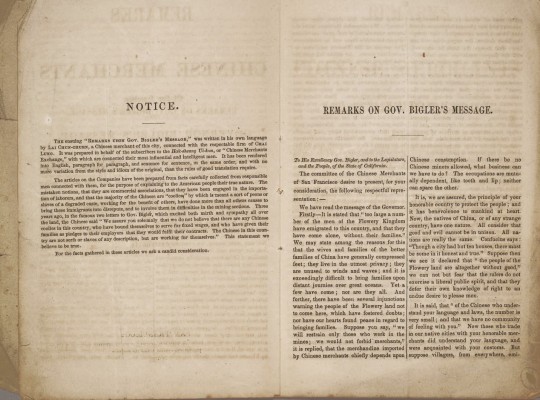
The preface to Remarks of the Chinese Merchants of San Francisco upon Governor Bigler’s Message, and Some Common Objections of 1855 (from the collection of the Bancroft Library). The second line of the first paragraph identifies Lai Chun-chuen as “a Chinese merchant of this city, connected with the respectable firm of CHAI LUNG.”
Chy Lung & Co. continued to play a leading role in the Chinese merchants exchange until Lai Chun-chuen’s death on August 30, 1868. The business remained a fixture of the Chinatown business community for the rest of the 19th century, and it adopted the new communications technology of the telephone, as shown by the Pacific Telephone directory for the Chinese Exchange in 1902.

The listing for Chy Lung & Co. as it appeared in the Wells Fargo directories of Chinese business for 1878 and 1882.
The Chy Lung & Co. business, and others established by Chinatown's merchants, soon comprised a source of both tangible and symbolic power within the rapidly growing Chinese community in the American West. As the Chinese immigrant population swelled, businesses catering to their specific needs diversified and expanded. A hierarchical structure emerged, influenced by both economic factors and the district of origin. The wealthier Sanyi individuals typically presided over larger, commercially successful enterprises, including import-export firms. Those from the Nanhai District dominated the men's clothing and tailoring sector, as well as butcher shops. The neighboring Shunde District populace exercised control over overalls and workers' clothing factories.
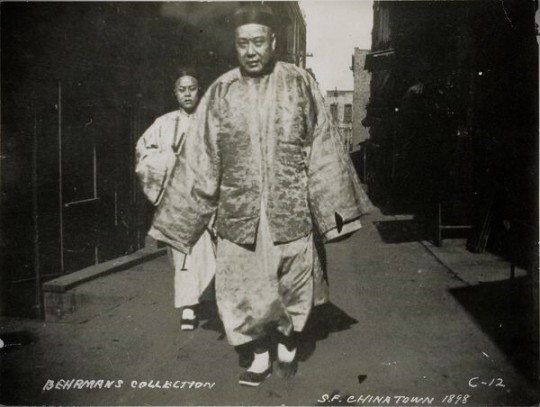
“S.F. Chinatown 1898 C12”. Photographer unknown (from the Martin Behrman Collection of the San Francisco Public Library). A well-attired merchant and possibly his son walk south on Spofford Alley from Washington to Clay Street.
Meanwhile, Chinese hailing from the Zhongshan District, which represented the second-largest Chinese population in California, were prominent in the fish and fruit orchard businesses, as well as in the production of women's garments, shirts, and underwear.
"Quan Quick Wah"
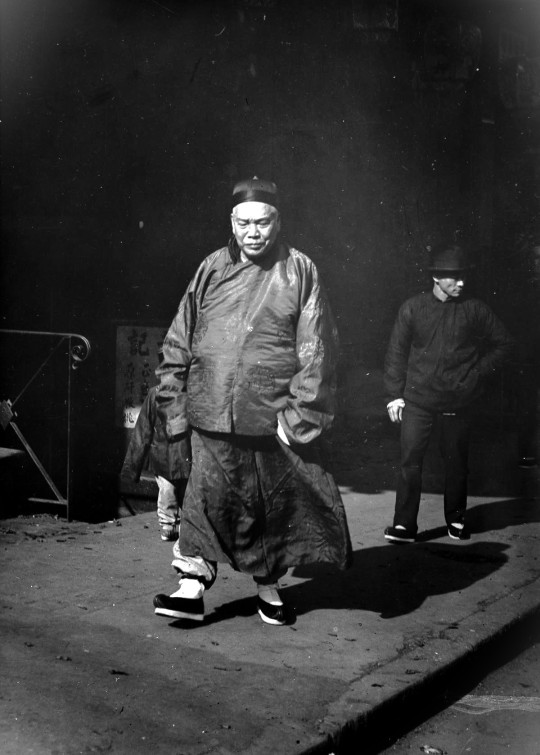
“Merchant and Bodyguard” c. 1896 – 1906. Photograph by Arnold Genthe (from the collection of the Library of Congress). A descendant of the large, confident man shown in traditional robes identifies him as San Francisco merchant “Quan Quick Wah.” Based on other photographs of this Chinatown location, the pair appears to be walking on the west side of Waverly Place toward its intersection with Clay Street. In his book about Genthe’s Chinatown photographs, historian Jack Tchen wrote about this imposing figure followed by a bodyguard as follows: “The powerfully built man dressed in traditional silk robes has been described as a tong leader. Whether he was a tong leader, a wealthy merchant, or both, his dress and carriage convey a strong presence. Tong leaders came to rival the power of wealthy merchants. The man following the merchant or tong leader is said to have been his bodyguard, protecting him from the attack of a rival tong. In the photograph the two are passing under ornate cloth lanterns that indicate a pawnshop business.”
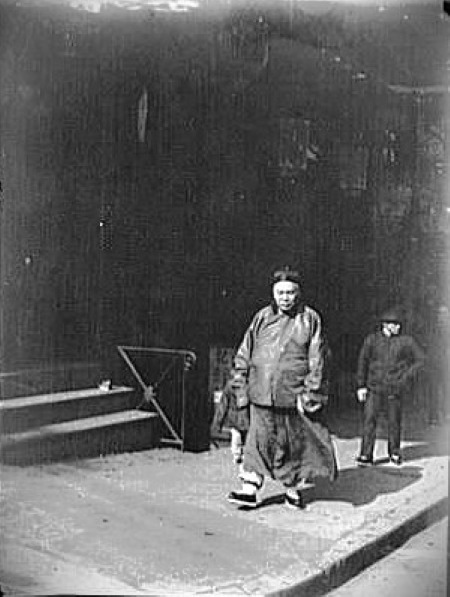
"Merchant and Bodyguard” c. 1896 – 1906. Photograph by Arnold Genthe (from the collection of the Library of Congress). This full photograph in the Library of Congress shows that Genthe’s image fortunately included a portion of the sign for the entrance to a basement restaurant. The signage (which appears in other photographs of this area), indicates that the merchant and bodyguard were photographed walking on the west side of Waverly Place (at about no. 23 and 25 Waverly) and toward the southwest corner of its intersection with Clay Street. Tchen’s guess that the background store frontage was a pawnshop is probably correct, as the “Qung Hing Art Co.” pawnshop occupied space at 25 Waverly during the 1890s. The headquarters of the merchant-controlled, Ning Yung district association was located at 23 Waverly.
Yee Ah-Tye
In old Chinatown, merchants’ personal use of bodyguards or alliances with fighting tongs were common. The organization and fragmentation of district and clan associations, along with sharp business competition, often placed lives, as well as livelihoods, at risk. For example, the Kong Chow association traced its origin to about 1853, when the influential community leader, Yee Ahtye (a.k.a. “George Athei”) persuaded members of his Yee clan of Sunning, which had remained in the Sze Yup Co. (after a number of clans split off to organize today’s dominant Ning Yung Association), to finally secede. The action by the Yee clan was joined by clans from Hoiping and Enping counties after a dispute over the presidency of the Sze Yup Co. in 1862. The resulting new association, the Hop Wo, soon challenged the merchant Ah-Tye for the custody of a piece of land on which Ah-Tye had allowed the Sze Yup Association to build a headquarters building. Yee eventually deeded the land to a new Kong Chow Association, which his fellow Sunwui merchants founded in 1866. The dispute over this property raised to such a level that Yee and his associates were compelled to organize a secret society, the Suey Sing Tong, to protect the asset and enforce his decision.
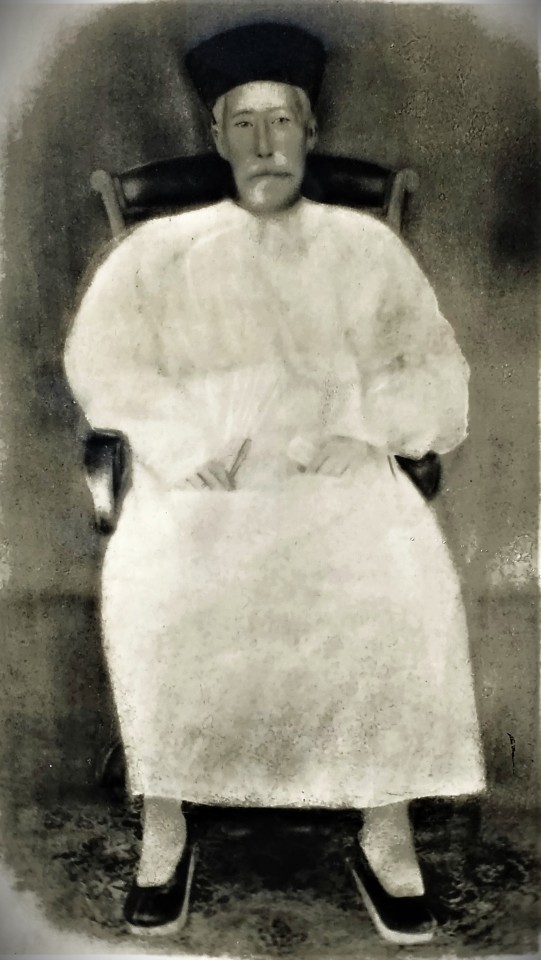
Portrait of Yee Ah-Tye (courtesy of the Chinese Six Companies). Yee was an elite merchant of Chinatown and was considered a co-founder of the Suey Sing Tong.
Born around 1829 in Guangdong province, Yee Ah-Tye had arrived in San Francisco just before the gold rush at around 20 years old. In spite of his humble beginnings, Yee had learned English in Hong Kong and swiftly ascended to a position of authority within the influential Sze Yup [pinyin: "Siyi"] Association. The Sze Yup Association, along with similar Chinese district associations, played a crucial role in assisting newly arrived Chinese immigrants during the 19th century. The organizations provided accommodation and job opportunities.
Aside from his many business accomplishments, Yee famously cross paths with the legendary, San Francisco madam Ah Toy. The conflict arose when Ah Toy accused Yee of demanding a tax from her prostitutes on Dupont Street. Despite her origins in China, Ah Toy had by then lived in America for three years and become familiar with its legal system. She boldly threatened to take legal action against him, a move she would not have dared to undertake in China.
The August 1852 report in the Daily Alta California newspaper highlighted Ah Toy's shrewdness, emphasizing her knowledge of living in America and her ability to navigate the legal system. She resided close to the police station, fully aware of where to seek protection, having faced legal proceedings herself numerous times. The reporter gleefully suggested that Yee use caution about overstepping his authority, warning that he might lose his dignity and end up in custody.
A year later, Yee faced legal trouble himself, being arrested for assault and grand larceny. The San Francisco Herald alleged Yee “inflicted severe corporeal punishment upon many of his more humble countrymen … cutting off their ears, flogging them and keeping them chained for hours together.”
After moving to Sacramento in 1854, Yee also relocated his business activities in 1860 to La Porte, California, where hydraulic and drift mining operations for gold occurred. Yee acquired a partnership in a store called Hop Sing & Company which supplied merchandise and Chinese contract laborers. By 1866, it was the richest Chinese store in that town, with a value of $1,500 (about $36,000 in 2005 dollars).
According to one of his descendants, Lani Ah Tye Farkas, the pioneer Yee Ah Tye reportedly lived thirty-four years in La Porte as a successful merchant, running the Hop Sing and Company store and representing the Chinese community in the area. He had three wives and four children, three of whom were girls. Unlike most other Chinese fathers at the time, he invested in the education of his daughters – he even bought a piano for his youngest daughter, Bessie, who became an accomplished pianist. As a leader in the Hop Sing Association, he founded a small hospital to serve the elderly Chinese men of La Porte.
“The temple ruins at San Francisco's Lincoln Municipal Park Golf Course was once part of the Lone Mountain Cemetery, a gift of Ah Tye,” Lani Ah Tye Farkas wrote in 2000. “Other glimpses of his life in America can be seen in deeds, mining claims, tax assessments, newspaper articles, and land that he once owned. Yee Ah Tye's legacy, however, is in his descendants. Many Chinese with common last names like Chan, Lee, and Wong may have no relationship with one another. However, the descendants of Yee Ah Tye have borne his unique last name through six generations, in the words of the Yee family genealogy, ‘spreading like melon vines, increasing continuously’” Yee died in 1896. (see: https://scholarworks.calstate.edu/downloads/pc289j76z)
Contract Labor
At the lower end of the business hierarchy, the Siyi or Four District residents comprised the largest and least affluent group of Chinese immigrants. They typically occupied occupations such as laundries, small retail shops, and restaurants and the bulk of the laborers in the contract labor system.
In the period preceding the Civil War, there was a concerted effort by certain individuals to introduce contract laborers into the United States. A letter penned by C. V. Gillespie to Thomas Larkin on March 6, 1848, sheds light on this initiative. Gillespie expressed a keen interest in the idea of bringing Chinese emigrants to the country, suggesting that a variety of skilled workers and laborers could be sourced:
"One of my favorite subjects or projects is to introduce Chinese emigrants into this country,… Any number of mechanics, agriculturists and servants can be obtained. They would be willing to sell their services for a certain period to pay their passage across the Pacific…."
The practice of importing contract laborers to the United States began in the late 1840s and continued through the 1850s. However, enforcing labor contracts proved to be a challenging endeavor on American soil. A case in point involved an Englishman who, upon bringing fifteen Chinese laborers to the country bound by a two-year contract, found that they immediately reneged on their agreement upon arrival. Authorities, at the time, were reluctant to intervene in such disputes.
In 1852, Senator George B. Tingley introduced a bill in the California State legislature aimed at legalizing and facilitating the enforcement of contracts allowing Chinese laborers to sell their services to employers for periods of up to ten years at fixed wages. This proposal, however, faced significant public backlash and was ultimately defeated after a heated debate. The subsequent year saw members of Chinese companies admitting that they had initially imported workers during the early years of the Gold Rush. Yet, due to unprofitability and difficulties in enforcing labor contracts, they abandoned this practice.
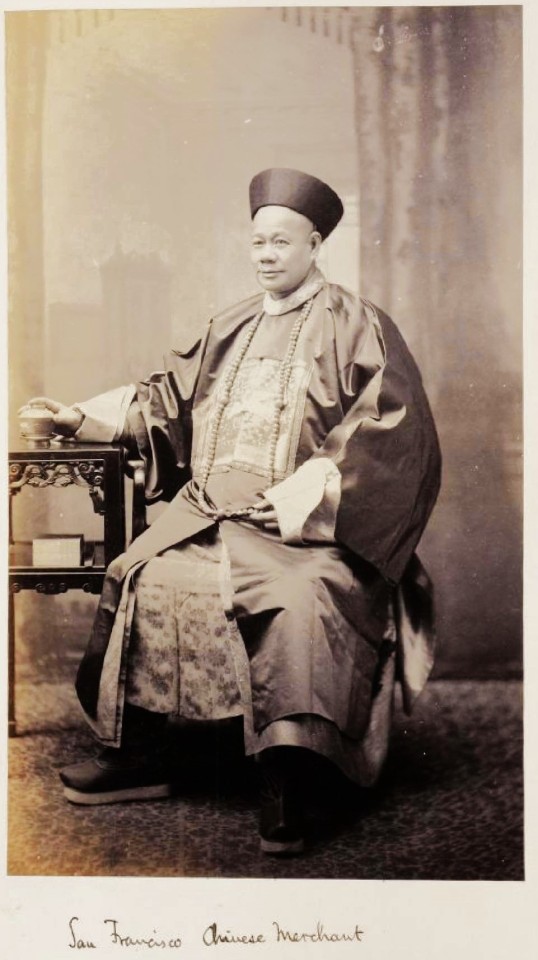
“San Francisco Chinese Merchant” no date. Photographer unknown, possibly by Ann Ting Gock (from a private collection). This rare and unusual image suggests that the individual might not have been a mere merchant at all, but a member of the Chinese consular staff. He is seen wearing his 清代官帽 (canto: "ching dai gwun moe") or official's headwear. The Qing official headwear or Qingdai guanmao (Chinese: 清代官帽; pinyin: qīngdài guānmào; lit. 'Qing dynasty official hat'), also referred to as the “Mandarin hat” in English, is a generic term which refers to the types of guanmao (Chinese: 官帽; pinyin: guānmào; lit. 'official hat'), a headgear, worn by the officials of the Qing dynasty in China. The merchant is attired in a "changshan" or "changpao" or long robe. The robe worn in the photo was derived from the Qing dynasty-period "qizhuang" (the traditional dress of the Manchu people). Changshan were, and are, traditionally worn for formal pictures, weddings, and other formal Chinese events.
Credit-ticket System
Beyond the initial years, it became widely acknowledged that Chinese immigrants arrived in the United States voluntarily, free from any servile contracts or duress. Many emigrants either financed their own passage or received assistance from relatives and friends already residing in California. The prevailing method for the majority of Chinese immigrants during the 19th century was the credit-ticket system. Under this system, an emigrant would receive financial support for their passage in a Chinese port. Upon reaching their destination, the emigrant was expected to repay this debt using their future earnings. It is important to note that this system differed from the contract labor arrangement, where laborers were bound to serve for a specified duration.
The precise origins of the credit-ticket system remain uncertain. However, merchant brokers in Hong Kong were established to provide advanced passage funds, approximately forty dollars, to the emigrants. Corresponding entities in the United States were responsible for collecting these debts and aiding the newly arrived immigrants in finding employment.
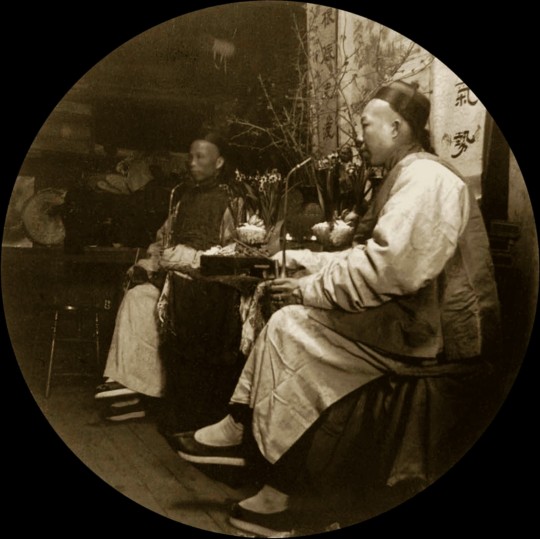
Two merchants with pipes. No date, photographer unknown (from a private collection).
The stores and offices that the merchants of Chinatown had opened starting in the mid-19th century became the basis of real and symbolic power in the growing regional community of Chinese living in the American West. That power, including the ability to mobilize for social change within the narrow role afforded Chinese in the society, manifested itself in the family and district associations headed by local merchants.
“The merchant class has traditionally been the one sector of Chinese society able to foster unity and bring about social change,” wrote historian Thomas W. Chinn about the role of the merchant class in San Francisco Chinatown (and beyond). “The merchant-directors of the Chinese Consolidated Benevolent Association must be well-established businessmen in the local community as well as outstanding members of their own family associations. They have already played a leading role in their own social circles before becoming merchant-directors, and they enjoy a great deal of respect. . . Thus the friendly corner grocer may simultaneously be the president of his family association and his district association as well as a merchant-director.”
Lew Kan
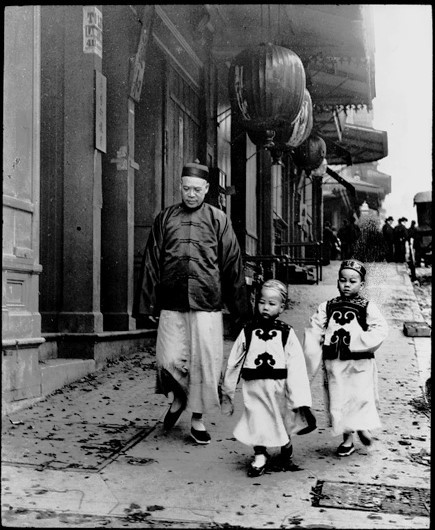
“Children of High Class” c. 1900. Photograph by Arnold Genthe (from the Genthe photograph collection, Library of Congress, Prints and Photographs Division). Merchant Lew Kan (a.k.a. Lee Kan) walking with his two sons, Lew Bing You (center) and Lew Bing Yuen (right). According to historian Jack Tchen, “Lew Kan was a labor manager of Chinese working in the Alaskan canneries. He also operated a store called Fook On Lung at 714 Sacramento Street between Kearney [sic] and Dupont. Mr. Lew was known for his great height, being over six feet tall, and his great wealth. The boys are wearing very formal clothing made of satin with a black velvet overlay. The double mushroom designs on the boys’ tunics are symbolic of the scepter of Buddha and long life.” The photograph appears to have found the trio walking down the south side of Sacramento Street below Dupont Street.
By the time photographer Arnold Genthe had photographed merchant Lew Kan and his two sons on Sacramento Street (as well as two other earlier photos of their four sisters in Portsmouth Square), Lew had already attained legendary status as one of Chinatown’s leading merchants. Born in 1851, Lew entered the US in 1866.
Author Roland Hui (in his biography of pioneer Chinese American industrialist Lew Hing), wrote about Lew Kan and his dry goods business called Lun Sing & Co. at 706 Sacramento Street as follows:
“He started Lun Sing, one of the oldest businesses in Chinatown, around 1867, a year after he immigrated to the U.S. In 1896, the business gained notoriety by harboring a young Chinese revolutionary named Sun Yat-sen during his first visit to the continental United States. Sun advocated overthrowing the Qing monarchy and establishing a Chinese republic. His ideas were too radical for the politically uninitiated Chinese community. Kang Youwei, the architect of the ill-fated “Hundred Day Reform” in China in 1898, favored establishing a constitutional monarchy around Emperor Guangxu. Forced into exile after the power-hungry Empress Dowager crushed his reform, Kang launched the Chinese Empire Reform Association, also known as Baohuanghui (Save the Emperor Society), the following year in Victoria, Canada. Baohuanghui quickly gained widespread support among overseas Chinese since the idea of having an emperor at the top of the social order who ruled with the Mandate of Heaven had been ingrained in the Chinese psyche for thousands of years. The San Francisco Baohuanghui chapter was founded in 1899 at 146 Waverly Place. Lew Kan supported Kang’s political agenda despite having met Sun several years earlier, and in 1901 became the president of the San Francisco chapter of Baohuanghui. Many scholars observed that Baohuanghui was the first organization that evoked the patriotic sentiments of overseas Chinese. And when Liang Qichao, Kang's most famous student, stopped over in San Francisco during his 1903 America tour, thousands of Chinese flocked to listen to his speeches. As the man who organized these community-wide activities, Lew Kan's stature and influence in San Francisco Chinatown must have been substantial. In addition, he was one of the wealthiest Chinese merchants, reportedly owning several general merchandise stores with an estimated net worth of $2 million. That was an astronomical sum in those days. In addition, he was a director of the Kong Chow Company, a district association representing Xinhui."
Decline of Merchant Influence
The organizational expression of Chinatown’s merchant elite, the Chinese Six Companies, wielded considerable authority within San Francisco and beyond. The Six Companies and its constituent district associations comprised the quasi-government of Chinese America, offering social services, mediating disputes, and representing the community's interests to external forces. With the enactment of the Chinese Exclusion Act in May 1882, their grip on power began to weaken.
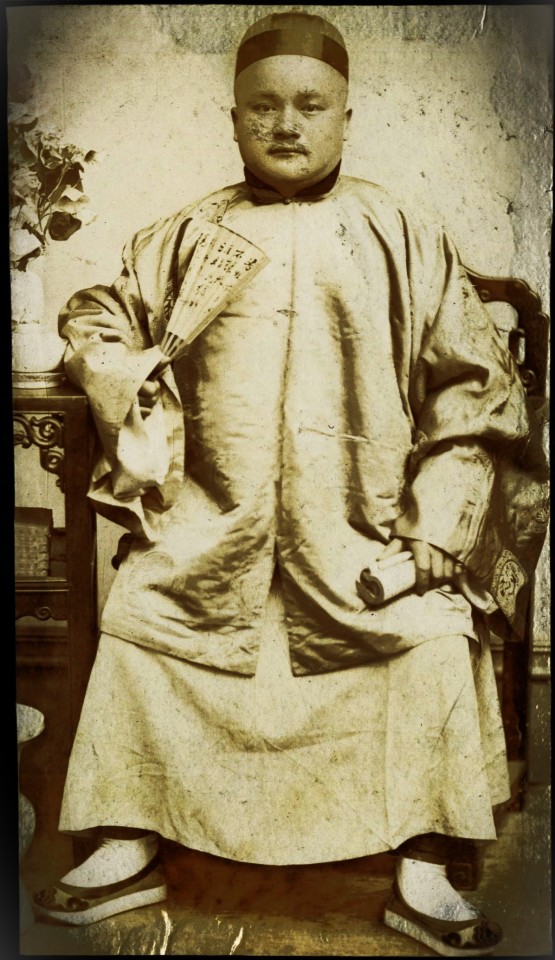
Portrait of a merchant with fan and scroll. No date, photograph possibly by Shew’s studio (based on the detail of the end-table), from the collection of the Stanford Libraries.
The decline of the Six Companies’ influence can be attributed to various reasons. One significant factor was their inability to adapt swiftly to the evolving socio-economic landscape within Chinatown. As the community faced new challenges, including the punitive extension of Chinese exclusion with the Geary Act of 1892, the Six Companies struggled to effectively navigate these changes, leading to a loss of faith among the populace in their ability to address emerging issues.
The Geary Act of 1892 extended and strengthened the Chinese Exclusion Act of 1882, requiring most Chinese Americans – native and foreign-born -- to carry an internal passport in the form of certificates of identity or face arrest and deportation. It intensified discriminatory measures against the Chinese community, fostering widespread discontent and resistance.
In response, the Six Companies initiated a national boycott against the Geary Act. The boycott aimed to unify Chinese immigrants and their supporters across the United States, urging them to refuse compliance with the law as a form of protest. It gained substantial momentum, with significant participation from Chinese communities in various cities, voicing opposition to the Act's discriminatory provisions.
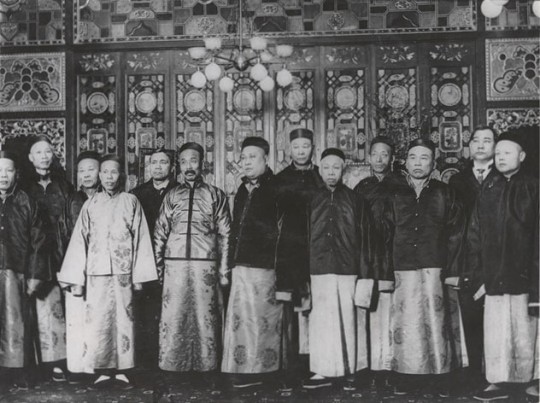
The board of directors of the Chinese Six Companies, no date. Photographer unknown (from the collection of the Bancroft Library). Based on the screen panels in the background (which remain in the Six Companies’ meeting hall at 843 Stockton Street in San Francisco), the photo appears to have been taken after 1906.
Despite its initial vigor, several factors led to the ultimate collapse of the national boycott against the Geary Act. First, the federal government intensified its efforts to enforce the Geary Act. Authorities conducted widespread raids and inspections, threatening deportation and imposing harsh penalties on those failing to comply. The fear of reprisals and the potential disruption to livelihoods coerced many Chinese immigrants into reluctantly acquiescing to the Act's demands.
Second, the broader American society exhibited little sympathy or support for the Chinese community’s plight. The prevailing anti-Chinese sentiment in the country and the lack of significant political backing from other institutions diminished the effectiveness of the boycott. Without widespread solidarity, the Chinese American community struggled to sustain its resistance.
Finally, the decision by the US Supreme Court in Fong Yue Ting v. United States, 149 U.S. 698 (1893), dealt a major legal setback to Geary Act resistance and undermined the credibility of the Six Companies. The decision validated the Geary Act and created an environment of fear within the Chinese American community. The inability to overturn the Geary Act by legal means diminished trust in the Six Companies’ capacity to protect the community's interests.

Photograph of a merchant from Chinese Business Partnership Case File for Quong Lee Company, c. 1896. Photographer unknown (from the files of the Department of Justice, Immigration and Naturalization Service, San Francisco District Office). The immigration investigative case file indicates that the individual in this photo was certified as a business partner and a "merchant" who was “able to travel to and from the U.S. as a ‘Chinese subject of exempt class’ under the ‘Chinese Exclusion Acts’ (1882-1943).” The Quong Lee & Co. (a.k.a. Quong Lee, Quong Lee Sing) operated what business directories from 1875 to 1905 variously described as a “tailor,” “general merchandise,” “clothing,” and “dry goods” business continuously at 828 Dupont Street. By the time this merchant sat for his photo in 1896, the national boycott led by Chinese merchant organizations against the Geary Act of 1892 had collapsed, and studio portraits such as this became an essential pieces of evidence to support applications for the coveted merchant exemption from the extended Exclusion Act.
This heightened sense of vulnerability played into the hands of tongs, which, capitalized on the weakened merchant community. Amidst the faltering influence of the Six Companies, tongs emerged as influential entities that would come to dominate Chinatown’s socio-political structure and shape mainstream society’s perceptions of the Chinese community for the next three decades.
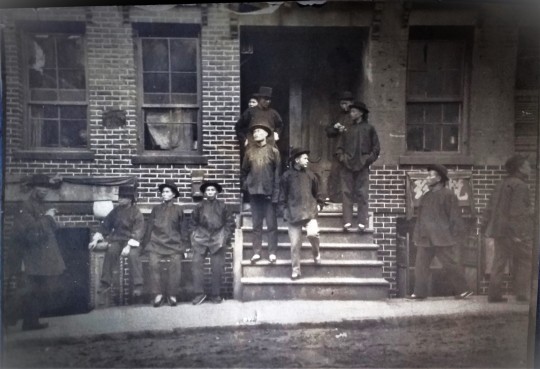
“High-binders Retreat” no date. Photograph by Goldsmith Brothers (from the Cooper Chow Collection of the Chinese Historical Society of America). Tong members at ease in front of their fraternal order's headquarters.
Tongs, in contrast to the Six Companies' diplomatic approach, adopted a more assertive stance in responding to discrimination and persecution faced by the Chinese community. Their readiness to protect their members (which also included merchants), and defy external pressures resonated with many disillusioned residents.
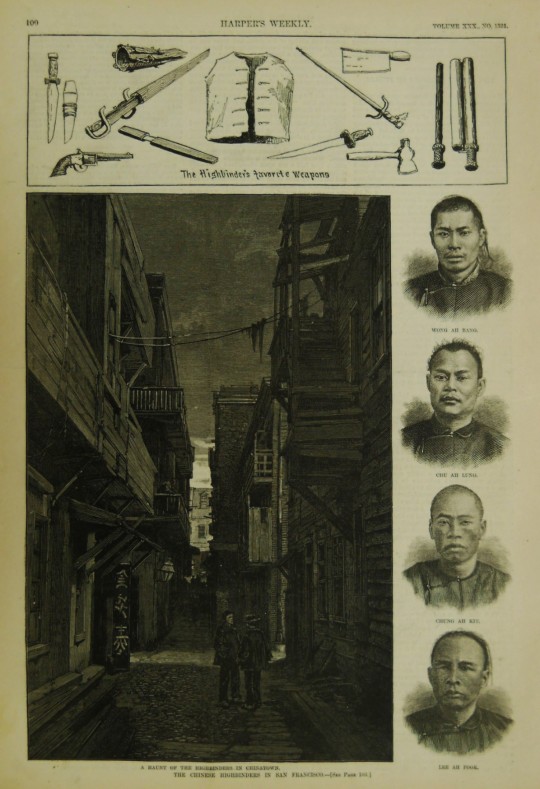
“A Haunt of the Highbinders in Chinatown.” Harpers Weekly, February 13, 1886 (from the collection of the Bancroft Library).
Moreover, the tongs during this period had begun to diversify their activities beyond traditional, illicitl sources of income such as prostitution, gambling, and drug distribution. Tongs began engaging in both legitimate businesses, including labor contracting for the Alaskan canneries. This diversification allowed them to accumulate resources, expanding their sphere of influence within Chinatown and beyond as alternative community governance structures, while still reserving often violent means to protect their interests.
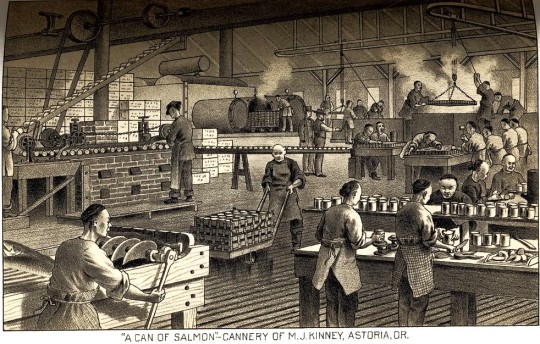
Chinese salmon cannery works in Astoria, Oregon, c. mid-1880s. Drawing from West Shore, June 1887, from the Special Collections, University of Washington). The early 20th century would be marked by violent struggles between tongs such as the Suey Sing and Bing Kung for control over the labor contracting business for the canneries.
The ascendancy of tongs at the turn of the century coincided with the republican movement in China. Historian Phil Choy wrote that the Chee Kung Tong, the original triad society, had been evolving in response to revolutionary movements in mainland China:
“Chee Kung Tong returned to its lofty political ideologies in 1900 when both Kang Yu-wei’s Reform Party and Sun Yat-sen’s Revolutionary Party sought its assistance. Originally the Chee Kung Tong supported Kang Yu-wei, but as Dr. Sun’s ideology gained popularity, the Chee Kung Tong, switched allegiance. When in 1904 immigration officials did not allow entry to Sun, the leader of the Chee Kung Tong, Wong Sam Ark, and the Tong’s attorney Oliver Stidger, along with Reverend Ng Poon Chew and Reverend Soo Hoo Nam Art, worked successfully for his release. Sun stayed at the Chee Kung Tong headquarters and used the society’s newspaper, the Chinese Free Press, to propagandize his revolutionary cause. Accompanied by Wong Sam Ark, Dr. Sun went on a nationwide tour to generate support and contributions.”
The tongs’ economic power and their active involvement in fundraising for the republican movement not only showcased their financial strength but also demonstrated their ability to wield influence as an overlapping and sometimes counter-force with the merchant elite. This dual role as (1) economic powerhouse within the local community, and (2) significant contributor to a revolutionary cause overseas underscored their influence. The growth of that influence came at the expense of the merchant elite in shaping both local and international affairs.
Merchants, however, would continue to exert influence through clan organizations, tongs, business associations, Nationalist Party of China chapters, and Chinese “consolidated benevolent associations” in San Francisco Chinatown and communities across North America through the exclusion era, war, and peace.
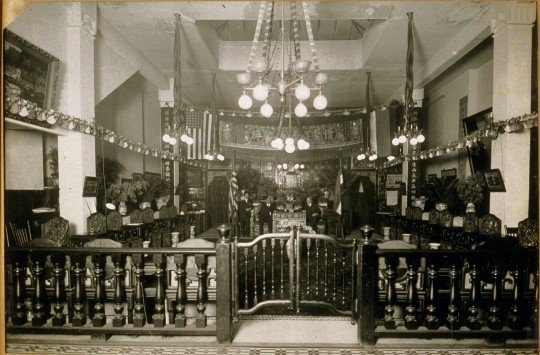
The meeting hall of the Chinese Six Companies, c. 1920 (by then incorporated as the Chinese Consolidated Benevolent Association) at 843 Stockton Street in San Francisco. Photographer unknown (from the Jese B. Cook collection of the Bancroft Library).
Chinatown's merchant community would face new challenges to their capacity as civic leaders when the political center of gravity across US Chinatowns would shift again in the last quarter of the 20th century.
[updated 2023-12-28]
#Chinatown merchants#Sing Man#Choy Chew#Chinese Merchants Exchange#Fung Tang#Lai Chun-chuen#Chy Lung & Co.#Yee Ah-Tye#Chinese Six Companies#Kai Suck#Ann Ting Gock#Lew Kan#Chee Kung Tong#Quong Lee & Co.
0 notes
Text
The Magic of Christmas Part 2/8
You know how in the first part I told you Steve's experiences were a lot like mine? Well his opinions on alignments in D&D are also mine.
Just the best friends looking out for our boys. They'll come around.
Part 1
***
Eddie came bounding up the stairs to his loft, contract clutched in his hand. He threw open the door to see Chrissy on their sofa munching on leftover Chinese food right out of the box.
“Sir Edward the brave!” she greeted. “How went the meeting with the dragon?”
Eddie tipped over the arm of the couch, landing face first next her, his legs bent at the knee straight in the air.
Chrissy ran her fingers through his hair. “That bad?”
Eddie held up the paper and she took gingerly. She set her food down on the coffee table and began to read the contract.
“Shit, Eddie,” she whispered. “This is insane. He’s basically offering to pay for all your bills for the next six months so you can work on his commission without worry.”
“Aswllasexpnses...” he mumbled into the sofa cushion.
Chrissy’s eyebrows shot up. “All your paint, brushes and canvases?” Eddie nodded. “Is this guy touched in the head? Like more money then sense?”
Eddie brought his knees underneath him like a worm and sat up. “No. He’s really sweet. I looked him up on the way to the meeting. He inherited the business and his money from his dad. The business actually lost money for the first two years he took over because he made the company private again. He bought all the stocks and closed it on the stock market. Then spent those two years doing away with all the shady business shit that his old man had built the business on.”
“An ethical business man?” Chrissy asked skeptically. “Isn’t that like an oxymoron or something?”
Eddie shrugged. “I guess. But seriously he was super sweet and like is my biggest fan. Like unironically.”
She blinked at him. “And he doesn’t want anything...well sexual from you?”
“We joked about that,” Eddie said with a huff of laughter. “But no. He’s just painfully earnest.”
“Oh my god,” she hissed. “You’re already half in love with this guy, aren’t you?”
Eddie blushed. “I’m trying hard not to be. Like really, really trying.”
Chrissy sighed. “You better take it. You know you won’t be able to live with yourself if you turn this down. What’s the subject matter?”
“D&D.”
“Christ!” she spat. “If there was a honey trap designed especially for you, this would be it. Hot guy, because he is, isn’t he?” Eddie nodded, pursing his lips. “Hot guy, rich, willing to pay for everything for six months for you to do a major D&D piece. The only thing that would make it perfect is kids or your NSFW shit.”
Eddie blushed. “It’s not exactly kids. But the painting is for these guys he used to babysit when they were kids and they’ve had these characters since they were fucking twelve.”
Chrissy sighed. “Are you should you’ve never met this guy, because hot damn, Eddie, he’s got you all figured out.”
Eddie barked out a laugh. “I think I would remember that face if I had. He is too good to be true, sure. But like you said, there is no way I’m going to get a better offer this year. This lifetime even.”
She grabbed her purse from the side of the couch and dug around for a pen. She pulled it out and handed it to him.
Eddie nodded and signed the contract. There. It was done.
*
Their next meeting was a bit more formal. As in it was actually on the books instead of Steve trying to get around Robin so she wouldn’t tease him about hiring his favorite artist to paint something for his little nuggets.
Eddie had pulled his chair up to the desk so that he could put his notepad on it. He cracked his knuckles.
“All righty,” he said cheerfully, “whacha got for me, Stevie?”
Out of another leather folio Steve pulled out four pieces of paper and slid them over.
“These aren’t the originals,” he explained. “I got Dustin’s mom who works at the library to make copies while he was in class.”
Eddie picked up the papers and gasped. “Their character sheets! Holy hell, man. These are like the holy grail. Why did Dustin have all four?”
“Lucas has the habit of losing his and Mike tends to forget his at home,” Steve explained, “and Will has never done anything wrong in his life, but they all agreed since they play at Dustin’s house all the character sheets are kept there.”
Eddie laughed. “Fair enough.”
This would make it easier to design the characters. By a lot.
Steve bit his bottom lip. “I have something else that might help you, but I don’t know how you feel about basing your art on other people’s work.”
Eddie frowned. “What do you mean?”
Steve pulled out another piece of paper, this one showing four characters fighting a beholder. It was good, but not even on the level of Eddie’s earlier work.
“Who did this?” he asked.
“Will,” Steve replied. “But I didn’t want to ask him to do it because it was partly for him, too.”
Eddie nodded. “No, actually this will help.”
Steve lit up. “Really?”
“Yeah,” he said with a big smile. “Knowing what they think their characters look like will help makes sure I don’t fuck it up for them.”
Steve relaxed. “Oh that’s great. I’m so glad. I didn’t want to step on anyone’s shoes with this. I really want everyone to be happy.”
“I will do my best,” Eddie promised. “But you know, I have to ask...why a purple dragon?”
“Oh,” Steve said with a blush. “It’s because they can shapeshift into human-like creatures.”
Eddie’s eyebrows shot up. “Do you play D&D, Stevie?”
Steve shook his head. “No, but I like to read the handbooks. They’re interesting. Plus, I like looking at your artwork.”
“All chromatic dragons are chaotic evil, you know?” he said with a smirk.
Steve scoffed. “I always thought that was bullshit. If other sentient beings like elves, dwarves, humans and gnomes can be any alignment then so should dragons.”
Eddie laughed. “Only the handbook says that other than humans each race tends toward neutral, chaotic, or lawful.”
Steve rolled his eyes. “Which is also ridiculous. It’s like saying only humans can be of any alignment because they don’t live long enough to be set in their ways. Like a dwarf who had lived for a couple centuries couldn’t be chaotic? Or an elf?”
“You certainly have a lot of opinions for someone who doesn’t play,” Eddie said with a smirk.
Steve flushed. “Dustin is one of those people that will steamroll over top of you if you can’t keep up with the conversation.”
“Ah.”
Eddie knew several players that were like that. Most of them were insufferable know-it-all rules lawyers. He had a feeling that Dustin was like that too.
“He’s their wizard,” Steve said. “Mike is a paladin, Lucas is a ranger, and Will is their rogue.”
Eddie nodded as he shifted through the papers Steve had had given him.
“What’s your favorite color of dragon?” he blurted out.
Steve blinked at him for a moment. “It’s really stupid.”
“Hey.” Eddie kicked the desk and he startled. “No limiting yourself. That includes thinking your favorites are dumb.”
Steve blushed deeply. “Yellow. It’s my favorite color. Plus it’s super rare. Then I found out chromatic dragons are all evil...”
“And suddenly your favorite is considered sus,” Eddie said with a nod of his head.
“Also how are metallic dragons the good ones?” Steve asked. “Like wouldn’t they be the greedy ones?”
Eddie smiled. “How many people told you picking the gold dragon was the same as picking the yellow one?”
Steve’s jaw dropped. He licked his lip slowly and then bit down on it.
“All of them, huh?”
Steve nodded. “It’s ridiculous. But I just don’t think that gold and yellow are the same color.”
“Oh they absolutely aren’t,” Eddie said, his smile growing wider. “And if anyone gives you hell about it send them my direction.”
Steve clasped his fingers together and leaned on his forearms. “That’s something else. They are going to find out that I am meeting with you on reg.”
“So what’s the cover story?” Eddie asked.
Steve ducked his head and Eddie’s eyebrows shot up.
“I was thinking of your charity, Roll for Initiative,” he admitted. “My kids...I can’t keep calling them that, they’re adults. But anyway. Having a large empty house for them to play D&D in when they kept getting kicked out of places to play. First their high school and then Mike’s parents house.”
Steve shrugged.
“But I know they were lucky because they had me. And I know that kids just like them would be kicked out their schools and libraries in the most conservative parts of the country. If they were allowed at all. I want to help you branch out more than just local.”
It was Eddie’s turn for his jaw to drop. “You want to help my charity?”
He had been wanting to take it on a national level, but never had the manpower to do it. And here was Steve offering to do just that.
Steve nodded. “Yeah,” he said with smile. “Just let us handle it. And we can combine meetings to go over the charity and you can show me your progress on the paintings.”
Eddie nodded back. He didn’t have the words. He squeaked his goodbyes and left.
Chrissy was going to freak.
*
Robin watched the flustered Eddie head to the elevator with more than a passing interest.
She calmly got up and walked into Steve’s office without even a knock or any notice she was coming in.
Steve raised an eyebrow at her.
Robin slid into one the chairs into front of his desk. “You gonna to keep blowing that poor man’s mind or are you going to ease up at some point so that he has the capacity to do this painting of yours?”
“I did my homework when it comes to the guy,” he huffed, “so what?”
Robin’s eyes went wide. “You put less effort into wooing your dates then you did trying to get this painting done. You have to see that’s a problem.”
“Only if you make it one,” Steve groused. “I admire this work.”
She scoffed. “I’ve seen his work. My personal favorite was female elf getting pegged by the female orc barbarian.”
Steve blushed. “Shut up. You know it’s not like that.”
“Do I?” she pushed. “This isn’t lord of the manor fucking his live-in artist.”
“I’ve already made that joke,” he sniffed. “He found it funny.”
Robin snorted. “He seems like the kind that would. Only it’s not funny if he hollers sexual harassment.”
He had been facing to the side and he turned his chair to face her directly. “That implies two things. That I’m trying to get into his pants and that he would be against it.”
“It wouldn’t matter if he consented, Steve,” she hissed. “You literally own him. He is a kept man.”
“You can’t have it both ways!” Steve snapped. “Either I’m paying for all of him, including sex or he can’t consent because I’m his boss.”
She threw her arms into the air. “Why are you even doing this?”
He glared at her. “I don’t have ulterior motives. I just wanted to do something nice for the kids. They’re going to be spreading far across the country after they graduate from college. Some to get advanced degrees, others to start their careers. I just want something special that they could take with them to remember everyone by.”
Robin sighed. “Okay. I get it. You’ll miss them, too. I keep forgetting they’re not the little twerps that used to beg for rides.”
“Yeah.”
She reached over the desk and took his hand. He gave hers a squeeze.
“I’m going to miss them something fierce.”
“I know, dingus,” she murmured. “I know.”
***
Part 3 Part 4 Part 5 Part 6 Part 7 Part 8
Tag List: @spectrum-spectre @estrellami-1 @zerokrox-blog @artiststarme @swimmingbirdrunningrock @gregre369 @pyrohonk @a-little-unsteddie @chaosgremlinmunson @chaoticlovingdreamer @maya-custodios-dionach @goodolefashionedloverboi @messrs-weasley @val-from-lawrence @i-must-potato @danili666 @carlyv @rozzieroos @wonderland-girl143-blog @justforthedead89 @emly03 @bookworm0690 @itsall-taken @vecnuthy @bookbinderbitch @redfreckledwolf @littlewildflowerkitten @yikes-a-bee @awkwardgravity1 @scheodingers-muppet @mira-jadeamethyst @cinnamon-mushroomabomination @genderless-spoon @anne-bennett-cosplayer @irregular-child @carlprocastinator1000
#my writing#stranger things#steddie#ladykailtiha writes#christmas#artist eddie#businessman steve#autistic steve harrington
167 notes
·
View notes
Photo
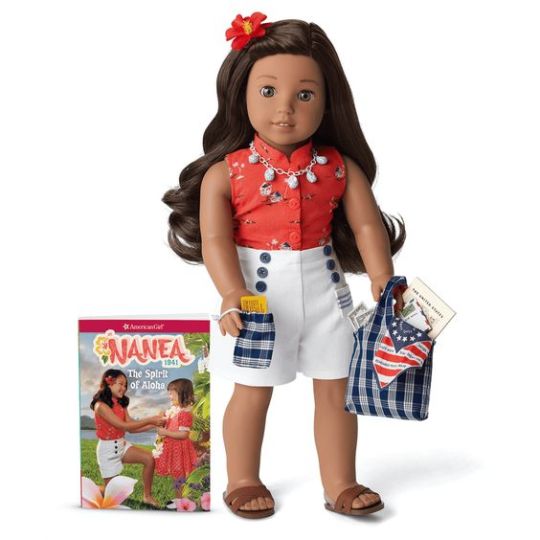
Nanea Mitchell is a half Scottish-American, half Native Hawaiian girl living in Honolulu, Hawaii in 1941 during the attack on Pearl Harbor. Her release was met with a lot of surprise. Going back to WW2, it seemed like AG was running out of history. But Nanea is pretty different than Molly. She covers the beginning of the war and the Pacific theater while Molly covers the end of the war and the European theater.
More than anything else, Nanea represents Native Hawaiians in the historical line. Being post BeForever, she only received two books. The two book format might seem to fit covering one event like Pearl Harbor better, but honestly, with Hawaiian history and culture and the beginning of WW2, there is SO MUCH to cover. I think the traditional six books for Nanea would be fantastic.
To start with, I’d like to see some before and after. Appropriating Pacific Islander culture was a major trend in the 1930s, and the Hawaiian tourism industry really took of. It would be interesting to see Nanea’s reaction to White actresses wearing sarongs and leis and poorly dancing the hula on the silver screen, or seeing sacred tikis reduced to cheap bar kitsch.
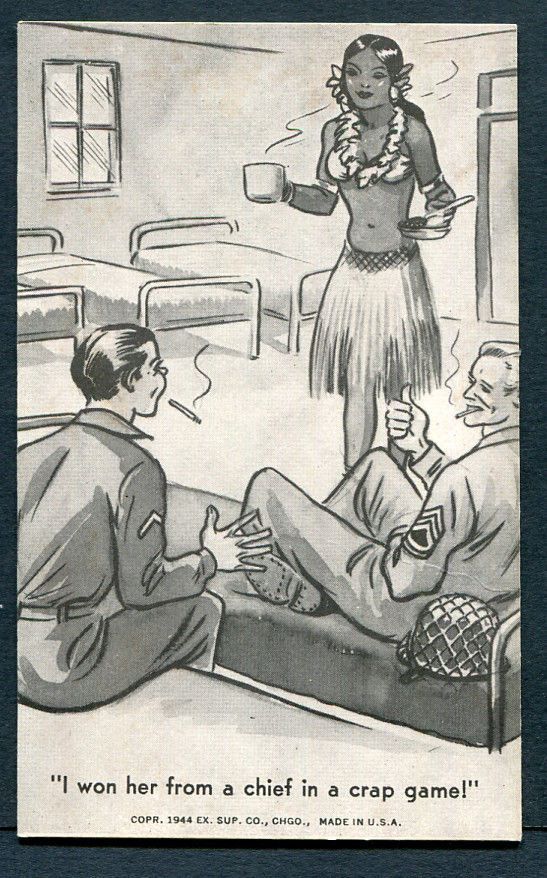
You can listen to or read the episode of the food history podcast Gastropod about tiki bars.
As far as the Pearl Harbor attack goes, one of the enduring and most fascinating parts of history is the normalcy that exists during crisis. My middle school orchestra performed at Disney World two weeks after 9/11 when people were still terrified of going into major tourist places for fear of attack. We visited Disney World in September every year and had the date scheduled in advance, we weren’t gonna let some fucking terrorists stop us. I’d love to see Nanea just being a kid in the middle of chaos.
And then there’s just the island’s history! There’s so many stories you could work out with Nanea just learning Hawaiian history!
Nanea’s style of blouse is called a tea-timer. It became popular in the mid-20th century after being appropriated from the Chinese cheongsam.
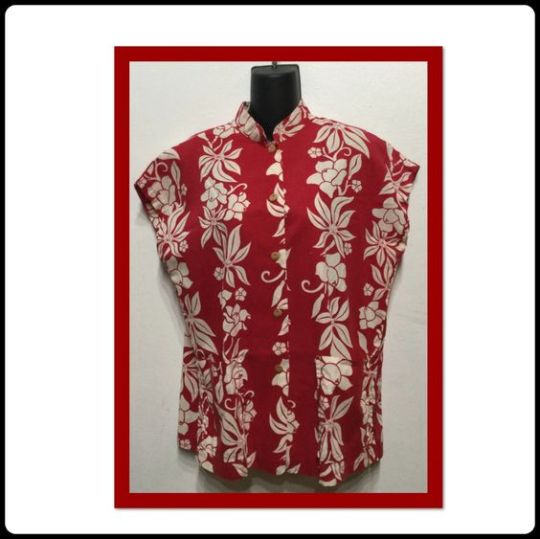
(SneakyTiki)
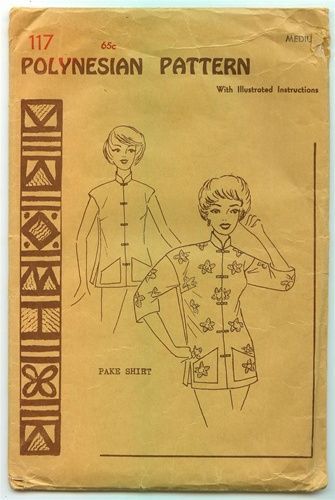
Her shorts are a sailor-inspired design called moku shorts, but I can’t find any information about their history.
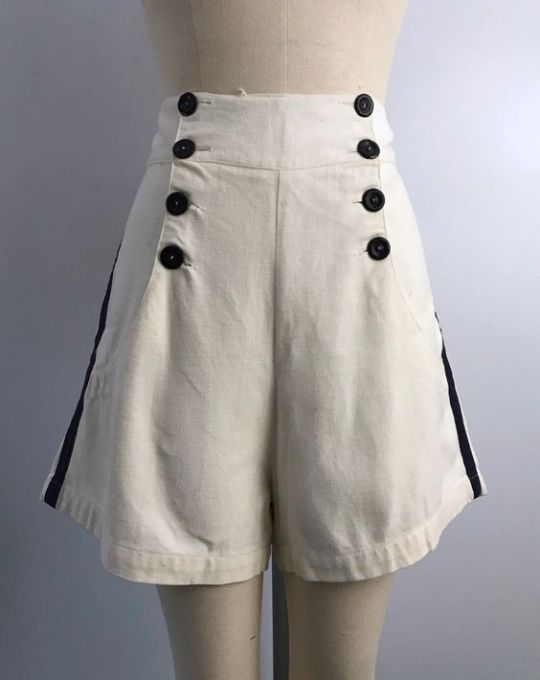
(Ritual Vintage, credit @in-pleasant-company)
Her little necklace is made out of (imitation) celluloid and seashells.
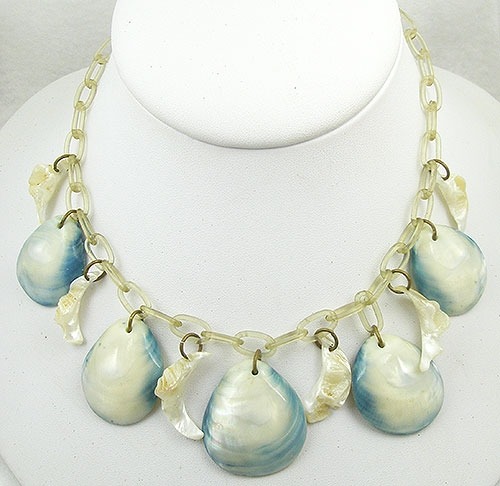
(Garden Party Collection Vintage Jewelry)
Here’s a pretty great article about Native Hawaiian reaction to Nenea’s release.
538 notes
·
View notes
Text
Daily update post:
Two independent terrorist attacks against Israelis took place over the last 24 hours. Yesterday, a Hamas terrorist stabbed in the back a 49 years old Israeli reserves soldier, who stopped to buy something at a shop in a gas station, on his way home. The soldier turned around and, despite being injured, pursued the terrorist, shot and wounded him. The terrorist was later arrested, he had a permit to work in Israel. In the second one, a terrorist started shooting at civilian vehicles passing by, and ended up injuring a 27 years old woman. Thankfully, a baby who is 1.5 months old, who was in the car with her, was not injured, despite at least 10 bullets being retrieved from her vehicle. The IDF is searching for the terrorist.
Israeli soldiers have found and confiscated suitcases with 5 million shekels in cash from the home of a senior Hamas terrorist in Gaza. I want everyone to understand that this sum is currently 1,369,507 $ (yes, I checked with professor Google), and that most Israelis will never see that kind of money. I imagine a majority of "privileged" westerners never will, either. And this kind of money was just lying around in this terrorist's home...

The IDF has exposed and is now in control of what is likely the biggest Hamas terror tunnel. It is about 4 kilometers long (roughly 2.5 miles), and it is wide enough for vehicles to comfortably drive through it. Israeli soldiers have also found footage showing Muhammad Sinwar, the brother of Hamas leader in Gaza Yahya Sinwar, doing exactly that, in addition to footage showing the construction of this terror tunnel...
youtube
I don't post every single day about the Israeli soldiers injured and killed in Gaza, because the truth is that it has become technically difficult and emotionally painful to keep track. Yesterday, five more soldiers were confirmed as killed, one of them having been injured last week, and he has now succumbed to his wounds. So far, 128 soldiers were killed in Gaza.
Last month, there was a cyber attack on Israeli hospital Ziv, trying to derail its medical activity. Israel has confirmed today that it has traced Iran and Hezbollah as responsible for the attack. If we count the cyber war (and in terms of requiring manpower and resources, as well as in terms of the potential loss in human life, there is no reason not to count it), then Israel has been defending its citizens on no less than six fronts.
The Iran-funded terrorist Houthis in Yemen have been attacking ships unconnected to Israel, for simply passing through territory close to Yemen. A lot of shipment companies from around the world have announced they will not be sailing through this area for at least a time, which means they would have to sail all around Africa, to pass goods between the far east and the western world. This will hurt the entire world's economy, as shipment prices are expected to rise (think of the Evergreen ship blockade of the Suez Canal... these ships will not be trying to get anywhere near the canal. Symbolically, Evergreen is one of the companies announcing they will no longer sail through the Red Sea due to the threat of the Houthis). This will financially hurt so many countries, including Egypt (which operates the Suez Canal), the US and China (this means Iran's move has created a rare moment when American and Chinese financial interests align). The biggest question is, when will the world fully take in the fact that the biggest threat to world peace is the Islamist regime in Iran, and start acting accordingly?
This is Haj Amin al-Husseini.
Out of all of the people who helped shape the Israeli-Arab conflict, he's probably the most influential one, an antisemite, a Nazi collaborator, and a believer in pan-Arab nationalism (he didn't want to fight Jews to establish a Palestinian state, he wanted to exterminate the Jews and establish a greater Arab Islamic state, a new chaliphate, if you will. There is a FASCINATING docu series in Israel, dedicated to the Arab and Muslim leaders who have fought Jews and Israel, interviewing intelligence agents from many countries. The ep dedicated to al-Husseini is unbelievable, and I wish everyone could watch it. It's available online, but sadly, only in Hebrew. The truth is, I don't think anyone can understand the Israeli-Arab conflict without understanding the role of al-Husseini in it, and how different things could have been, if only the more moderate Arab leaders in the Land of Israel at the time had managed to squash his influence, or if the British hadn't tried to "tame" him by appointing him to the position of Jerusalem's grand mufti.
This is the Belchassan family, 31 years old Yuval and Ofir, and their two years old son Tai.

On Oct 7, Yuval left Ofir and Tai to hide in the bomb shelter, and went out to fight off the Hamas terrorists. He and his friends saved their kibbutz, but now, as Ofir is due to give birth to a daughter, they have no home to bring her back to.
(for all of my updates and ask replies regarding Israel, click here)
#israel#antisemitism#israeli#israel news#israel under attack#israel under fire#israelunderattack#terrorism#anti terrorism#hamas#antisemitic#antisemites#jews#jew#judaism#jumblr#frumblr#jewish#Youtube
101 notes
·
View notes
Text
16 x dance | tim x reader


prompt: dance
pairing: tim rockford x reader
word count: 530
notes: fluff, working unpaid overtime, late night hours & take out food
summary: ten minutes on the clock until valentines is over
x. masterlist

It was day three of the rain. Like that heavy rain that the minute you step out in it, no matter how prepared you are, you feel it down into your bones. It had the entire city on edge. Crime was up, accidents were filling up the emergency room and tensions were boiling in the DA’s office.
You pinched the bridge of your nose as you pulled off your glasses. You could feel a headache forming. No surprise since it was gone 11 pm and you were still at your desk at the courthouse going over the files PD had brought up that morning at six am sharp. You didn’t bother checking your drawer for Tylenol, you’d done it enough times today to remember you were out. This wasn’t the first headache the day had brought.
You let out a deep sigh. Nothing was going anywhere fast. Especially with the DA butting heads with the Chief of Police. Both on the same side, however with a differing of opinions on how the case should be handled they might as well be fighting one another in court.
You looked at the clock on the wall again, wincing at the late hour, then to the small sofa you had in your office. The crick in your neck told you that it would be a bad idea to sleep overnight. Even if you had a change of wardrobe in the office for nights like this.
Just as you were debating packing up for the night a solitary figure walked by your office. The place was supposed to be empty save for the maintenance team. There was a sharp rapt, tap tap at your door before it opened and the familiar face of Tim appeared around the door, melting the tension from your shoulders away.
“Detective Rockford,” you greeted him as you pushed your chair away from your desk.
“Thought I'd find you here.”
The sight of him, so familiar and always a comfort these days, brought a small, tired smile to your lips. “Seems like the city doesn't sleep, so neither do we,” you replied, your voice betraying the exhaustion you felt deep in your bones.
He approached, setting the bag down on the corner of your desk, the aroma of Chinese take-out filling the room, a stark contrast to the stale air that had been your only company for hours. “I figured you hadn't eaten,” he set the bag down on a nearby table, then turned to you, a glint in his eyes, “and, you owe me,” Tim looked down at the watch on his wrist, a smirk on this lips, “and there are exactly ten minutes left of Valentine's Day, and I intend to make the most of it.”
Before you could protest, Tim had taken your hand and pulled you gently from your chair. There was a moment of hesitation, a brief interlude where the weight of your responsibilities threatened to pull you back to your desk. But then, Tim began to sway, leading you in an impromptu slow dance. There was no music, just the sound of the rain against the windows and the quiet hum of the building.
#x29 valentines#tim rockford#tim rockford fanfiction#tim rockford fanfic#tim rockford x you#tim rockford x reader#tim rockford x gn!reader#tim rockford x f!reader#pedro pascal character fanfic#pedro pascal character fanfiction#pedro pascal characters
51 notes
·
View notes
Text
Johnny Boy (part 4)
Werewolf! Johnny x reader
part one is here
Once upon a time, you would've done anything for John Mctavish. He had been your older brother's cool best friend, and you were always desperate for him to see you as more--until one fateful night that ends up with you pregnant and him...gone. Fast forward six years and you've made a good life for yourself with your daughter Emma, with Johnny none the wiser. Until he decides to knock on your door.

Part 4
Chapter 4
Charlie hung around you at work, keeping you company while you shared the load of reshelving books. Usually, it was the intern’s job but the holidays had left you short-staffed.
He was funny in a bashful way, blushing whenever he made you laugh. It was nice to see that you were still desirable sometimes, that men didn’t repel away from you just because you were a single mother.
“So, what are your plans tonight?” He asked, straightening up a section of R.L Stine books. “I’m supposed to have supper with my gran, she made me promise to bring chinese.”
“Emma’s father is in for a bit,” you said casually. “He’s coming to the house to see her.” He was going to find out eventually, might as well get it out of the way before your date later this week.
Charlie paused mid-shelf, raising a brow. “I thought he was out of the picture.”
“He was supposed to be,” you sighed. “Tom brought him back, and I couldn’t keep it from him anymore.”
Charlie knew your story, he spent two years weaseling it out of you while you were just coworkers. You knew he had a little crush on you, but you hadn’t expected him to actually ask you out until, well, he did.
“That’s shitty,” Charlie said, frowning. “So, what is he threatening legal action?”
Johnny probably would, to get to Emma. But you shook your head, “No, I just couldn’t bring myself to keep him away. She had already seen him and smelled him and was asking questions–I figured it was time.”
“I see,” Charlie said, even-tempered as always. “Is he good with her?”
You shrugged. “I suppose. I mean he’ll probably see her a few weeks out of the year, so I don’t know if it matters much if I allow him around her. I just don’t want her to resent me when she’s older.”
“It sounds like you’re being very fair,” he responded. “I don’t know if I would’ve reacted half as well if an ex girlfriend showed up wanting to see our kid.”
This was why you liked Charlie, he was so, so reasonable. He was older than you by a handful of years, in his thirties with a bachelor pad apartment and an obsession with historical fiction. The only downside about him was the fact he played rugby on his off days and his team was…sleezy, at best. They were all thirty-somethings that spent more time at the bar than the field.
“Thank you,” you said, smiling. “I feel like dousing him in gasoline and tossing the match, but I think I’m hiding it quite well, aren’t I?”
Charlie laughed, tucking a stray piece of hair behind your ear. “Very well, I think.”
On your way home, you stopped at the store for a pint of Emma’s favorite ice cream, strawberries and cream, and a pint of fudge brownie for yourself. You would eat it when Emma goes to bed and Johnny leaves, so you could fall asleep on the couch like a loser with your ice cream and Bridget Jones’s Diary on the telly.
Johnny was waiting at your house already, pacing like a caged dog. He looked up while you approached with Emma in hand, his eyes reflecting eerily off the street lights.
He calmed when he looked at the two of you, the jitteriness smoothing away in an instant as he smiled. Emma let go of your hand to reach him first, digging through her backpack to show off the A+ drawing she had gotten in art class.
You frowned and moved closer–she hadn’t shown you earlier.
“Me and Mum,” she said, gesturing to your vague figure wielding what looked to be a baseball bat, Emma standing behind you looking scared. “That time when she hit that scary man really, really hard.”
The bottom of your stomach dropped out, your hands breaking out in a cold sweat at just the mention of that horrible night.
You winced when Johnny looked at you questioningly, his posture straightening as if to intimidate.“Emma, hon, that doesn’t look like a good memory to me,” you said, shaking your head at him. Please don’t ask.
“I like it,” she said, tracing your stick figure’s stern features. “You haven’t got any teeth or claws but it didn’t matter.”
“Your mum never let little things like that bother ‘er,” Johnny said, bemused. “She used to brawl with her brother like a grown man.”
Emma smiled. “She still does.”
“Okay, Emma,” you interjected, cocking a brow at her. “The ice cream is melting, time to go inside.”
She nodded, disappearing into her room to shuck her school clothes and dig the clips out of her hair.
Johnny caught your arm as you took the pints out of the paper sack. “Whassat she’s talking ‘bout, kitty?”
“Oh, it’s…I don’t like to relive it, John.”
“C’mon, hen, it sounded pretty fuckin’ important.”
You sighed. “She got away from me at a grocery store last year, just bolted when I tried to catch her. I chased her around the store until I heard...well, I heard a scream.”
Johnny’s hand tightened around your arm, almost to the point of bruising.
“A man had cornered her in the parking lot. He was one of those wolf catchers, I think, the ones that take them and put them in those fighting cages.” You placed the ice cream in the freezer, your eyes clouded over with the memory. “I dunno what happened, I just…I saw red. There was a pipe on the dumpster and I grabbed it and swung and swung until there wasn’t much left.”
You remembered the feeling of blood on your hands, your daughter crawling into your arms to lick the tears off your face, trying to comfort, to bring you back to earth.
Johnny gripped your shoulders so he could look into your eyes, tilting your chin up with one of his calloused fingers. “You killed ‘im?”
You nodded. “The police…they already had warrants out for his arrest and there was a video documenting everything. I got off scot-free but Emma…Emma saw the whole thing. I still can’t forgive myself for it.”
“The fucker deserved it, love, trust me. You kept our daughter safe without teeth or claws.” Johnny brought you in for a hug for the first time in six years, his chest warm and broad and comforting. “And Emma will be fine, lass, I promise. She’s not like a human bairn–in her mind, you proved your strength as a mother, that you would do anythin’ for ‘er.”
Is that how they really thought? You relaxed in his hold without thinking, his shirt smelling like sweat and cologne and the unmistakable musk of a wolf. “I don’t even remember it, really. Apparently he got a few hits in before…but I never felt it–at least not until the hospital afterwards.”
Johnny gripped you tighter, his arms crushing your shoulders into his chest. “I’m sorry, kitty.”
“For what?” You asked dizzily, captivated by his warmth and smell. It was like he was putting off some kind of hormones, drawing you in closer.
“Fer not bein’ here. You’ve done it all alone.” His hand came to caress your face, thumb snagging on your lower lip. “You won’t be alone again, kitty.”
That made you pause. You stiffened in his hold, stepping away.
God, he was still so dangerous for you. You were pathetic, this was pathetic, he didn’t want you–he wanted Emma. He never would have come back for you.
“Sorry, John,” you said, forcing a smile. “Got a wee bit emotional there.”
But Johnny didn’t say a word. Just looked at you with his too-bright blue eyes and nodded, his jaw clenched with tension.
“I don’t think it’s a good idea to be…touching. Especially in front of Emma. The girls at school are already giving her the wrong ideas about you and I.” You leaned your hip against the counter, trying to be casual. “I don’t want to confuse her.”
You tensed, preparing for a classic Johnny display of the short temper he used to have.
Instead, Johnny smiled understandingly. “Of course, kitty, I’ll do what you need me to.”
He really was a different man. Perhaps all the war and killing really was good for his temperament.
You smiled at him, this one genuine. “Okay. I think I’m going to order in, how does Chinese sound?”
Johnny sat on your couch, eating beef Lo mein with your daughter on his lap. He seemed perfectly content, sharing his food with her and answering her ceaseless questions about explosives–Emma had found out that was what he specialized in.
A Christmas movie was on the telly, one of your favorites, and it was nice to be able to eat a meal without Emma snuggling into your hip and picking the meat out of your noodles.
Your earlier conversation with Johnny had lightened your mood, so you left them to the couch, curling up on the loveseat instead. You had been too distracted to eat at lunch so you got to work on your takeout, only feeling a brief bit of weirdness that Johnny had absolutely insisted on paying for the food.
Your phone rang from the countertop you had left it on. You sighed, setting aside your fried rice to answer it.
It was Charlie. A part of you warmed–you needed a distraction from Johnny.
You slipped into your bedroom, leaving the door cracked so you could still keep an eye on Emma. “Hey, Charlie,” you said, cupping the phone to your ear.
“Hey, honey, sorry for calling so late,” Charlie said, the soft noises of an elderly woman speaking in the background. “I was just thinking about you and thought I would see what you’re up to.”
“Takeout and Home Alone,” You said, sitting back against your bed. It was small and only really had room for you–which was a deterrent against men who ever wanted to stay the night. “How is Gran?”
“She’s fantastic, she’s eating pizza and watching Doctor Who on the telly, it’s our perfect night in.”
You laughed, enjoying the thought of a man who would routinely eat dinner with his grandmother two nights a week. “That sounds nice.”
“It is. What’s the bear up to?”
Emma and Charlie got along quite well, he was good with kids and Emma referred to him as “the book man.”
“John is over spending time with her, I’ve left them to it.”
“Ah, that’s right, I had forgotten. Do you need to go?”
“No, no, they’ll be fine for a bit. I needed a break anyway.”
You chatted to Charlie for a few minutes further before you returned to the living room, getting back to your fried rice without looking once at Johnny.
“Who was that, Mum?” Emma the Nose asked, eyeing your shrimp in a way that had you rolling your eyes.
“Charlie,” you said. “From work.” You refused to blush, knowing that Emma liked to tease, much like her father.
“A coworker?” Johnny rumbled, his eyes half-lidded and lazy. “Didn’t sound like it.”
You leveled a look at him, a look that clearly said none of your fucking business.
Johnny’s mouth quirked, though there was no humor in his eyes. “Sounds like a nice chap,” he said dryly, turning back to the telly.
60 notes
·
View notes
Text
Currently,the uyghur people of China are facing a genocide by the chinese government and Congo is in the middle of a brutal civil war. Both are in need of humanitarian aid,here's some info below
#free congo#uyghurs#uyghur genocide#free uyghurs#china is a genocidal dictatorship#congo genocide#important
46 notes
·
View notes
Text
Identity V Chinese 6th Anniversary Character Congratulations Messages (Part 1)
Part 2
Part 3
Gardener : So happy to see you again! Emma is very happy to attend the sixth anniversary party at Oletus Manor with everyone, and share happiness and touching moments together. Every day with everyone by my side, Emma is very, very happy, and I hope this happiness can be passed on forever. If you have any lovely manor stories, come and share them with Emma!
Lucky Guy : I always wonder what I can give on a day like this. Um... luck... or blessing? Well, luck. But, it's nice to have luck, right? Is there any lucky thing you can tell me?
Hell Ember : You guys! Don't set off fireworks or revelry indoors! The chairs are blocking the way, move them, and remember to put the opened treasure chests back in place... Hey, that one over there! Eat slowly, there are still many delicious foods at the banquet. Don't rush!
Doctor : It's spring again. Time flies. We have known each other for six years... It's an amazing number. It's also a long time in my life. So, have you found your "home" here?
Lawyer : I am Freddy Riley. It's been a long time since we last met. How are you doing in your work and life? I sincerely hope that you can spend a long and happy time here.
Thief : I remember that there would be occasional laughter and joy there during festivals, just like here today. It would be better if more sponsors came. Ah, look, there are big shots here! Excuse me, I'll go say hello!
Smiley Face : It's too quiet. Let me light some rockets to liven up the birthday party! Let's make some noise and laugh louder!
Coordinator : Long-term companionship is glorious and great. I am honored to have known you for six years. I wish our friendship a happy one and look forward to carrying out missions with you in the future. Happy 6th anniversary!
Gamekeeper : Happy 6th anniversary. The cake here smells so good. The animals in the forest are also restless. You are not allowed to go into the forest.
Explorer : Hi! Long time no see! Do you still remember the travel gift from last year? Do you still like it? From the fifth anniversary to the sixth anniversary, I have a lot more travel experiences to share with you this year. Please take some time to get together. No, I invite you to come and play!
Mercenary : The moments when you give it your all are well worth to be remembered. Yes, I remember you, in the middle of that lively battle. I look forward to meeting you again.
Magician : I like such lively and unique occasions. Countless artists gather in this manor, which always gives me endless inspiration! Let me see what new things these new friends of this year have created!
The Ripper : Greetings, it has been an honor to spend another One year. Here, take this rose, Let’s celebrate the 6th anniversary together.
Forward : Happy 6th anniversary! Thank you all for your kind invitation! The weather is great, the atmosphere is great, everyone is so nice, do you want to go out and have a game?
Soul Weaver : Thank you for inviting me to this birthday party again. You said you would let me participate in a wonderful performance... Thank you so much for remembering that I am an actress... I look forward to it every day.
Mechanic : Happy 6th anniversary! This year is really a very happy year. I have received a lot of love and praise, met many new friends, and learned new knowledge! In the days to come, we will always be together! I have prepared gifts for everyone who came to the anniversary party. They are still in various corners of Oletus Manor. Look for them!
The Mind's Eye : Thank you for your company this year. And for your learning and growth in the field of literature. —Ah, it was really a fulfilling year! In the future, please work hard with me!
Geisha : Happy 6th anniversary. It's been a long time since I've seen such a warm, lively and kind birthday party. I will enjoy it. Thank you for inviting me.
Priestess : In order to be together longer, and to pursue the blessings we expect, is this also out of our admiration for divinity? I like this kind of faith and sincerity. “God” will respond to every faithful believer.
The Feaster : Your prayers have been fulfilled. Wish Oletus Manor a happy 6th anniversary.
Perfumer : You have the scent of bravery, hard work and innocence. Let me think, what is the combination of... Oh? Are you asking for my perfume formula? Take a guess.
Cowboy : Thank you for inviting me to this birthday party. The sumptuous feast, the blazing bonfire, and the happy friends. All these are really nostalgic. Come on, come on, my bad, let's not say those depressing words. Cheers!
Wuchang : On a good day, I wish you happiness, health and peace.
Female Dancer : We should celebrate this day with joyful and free dance steps. Please be more confident! Come and follow my steps.
Photographer : Happy 6th anniversary, It’s an honor to be able to participate in such a grand meeting. Are you ready? This is a precious group photo from me for you all.
Seer : Blessings on the 6th anniversary. I’m grateful for your invitation, it’s still as crowded here, filled with sincerity. Prophecy can’t be according to one’s wishes, I deeply apologize, but believe my blessing is sincere.
Mad Eye : My God, what have you decorated the manor into? Balloons, flowers... these fancy things can be called decorations? Hahahaha, let me teach you how to arrange a grand banquet.
Embalmer : Thank you for your invitation. Turns out we have known each other for so long…….Thank you, I will put in effort to enjoy today’s festivity.
Dream Witch : My dear people, every year we celebrate the single-digit growth... Why don't you follow me into eternity?
Prospector : Congratulations on the 6th anniversary. There seems to be a lot more people here this year... Don't bother entertaining, I can do it myself. Thank you.
Enchantress : Happy 6th anniversary. God has blessed us and we have celebrated another year together. Every year at the banquet, there are always people who get sick from eating. I brought some herbs with me. If you need them, you can come to me.
#idv#identity v#idv seer#eli clark#idv mercenary#naib subedar#idv prospector#norton campbell#idv embalmer#aesop carl#idv photographer#joseph desaulnier#idv the ripper#idv jack#idv lucky guy#idv forward#william ellis#idv soul weaver#idv violetta#idv wu chang#idv priestess#fiona gilman#idv gardener#emma woods#idv perfumer#vera nair#idv mad eyes#burke lapadura#idv lawyer#freddy riley
28 notes
·
View notes